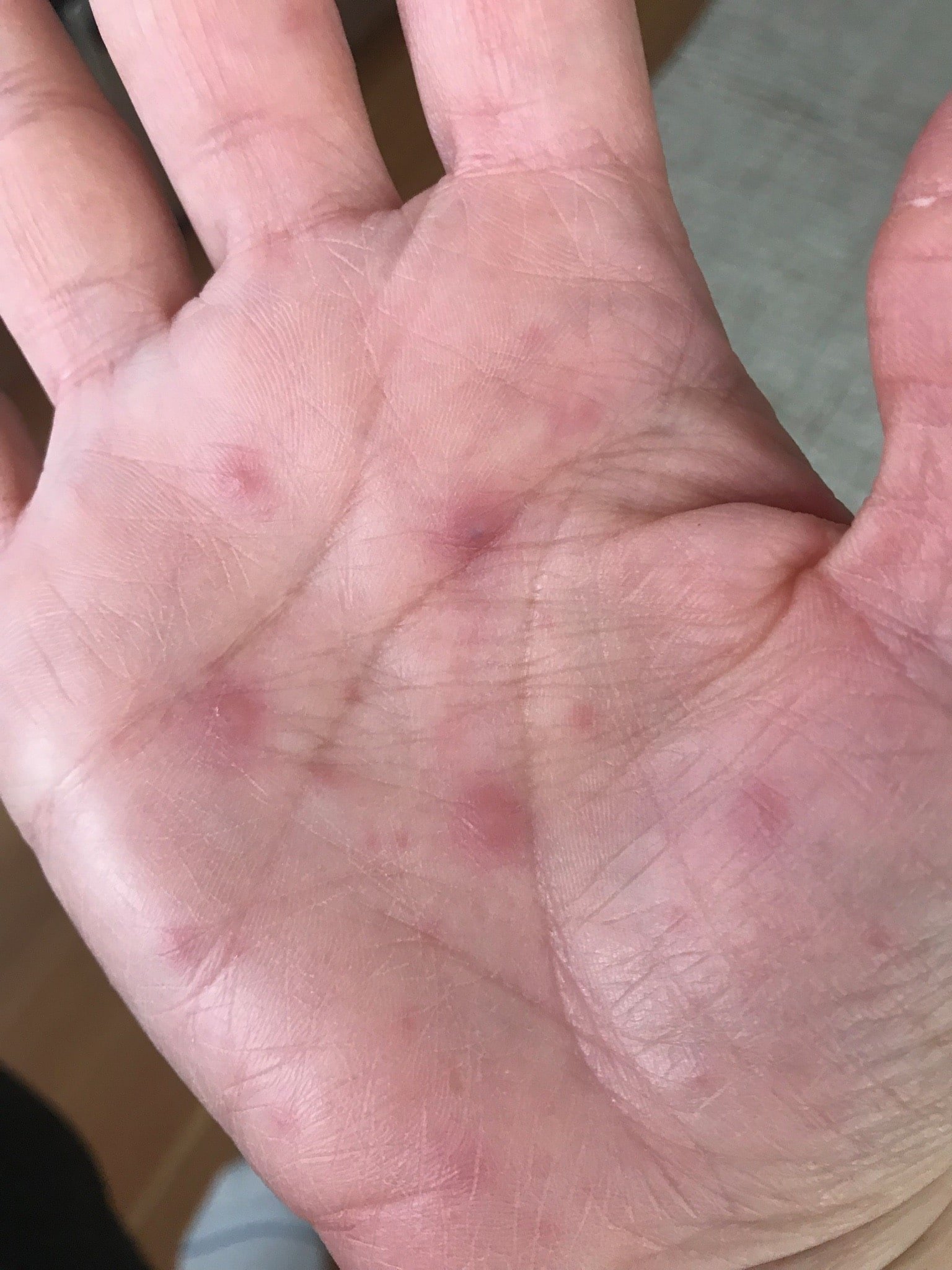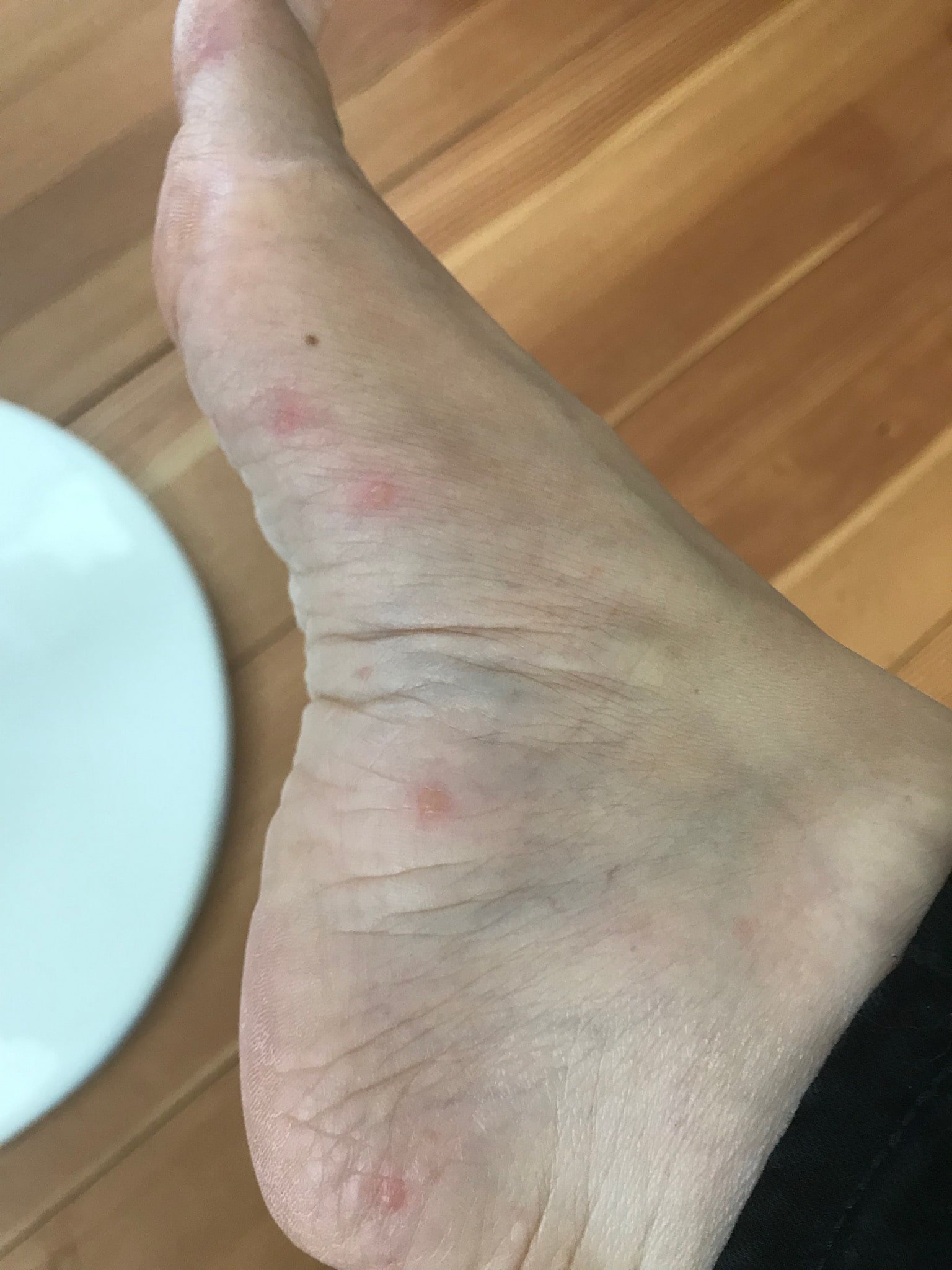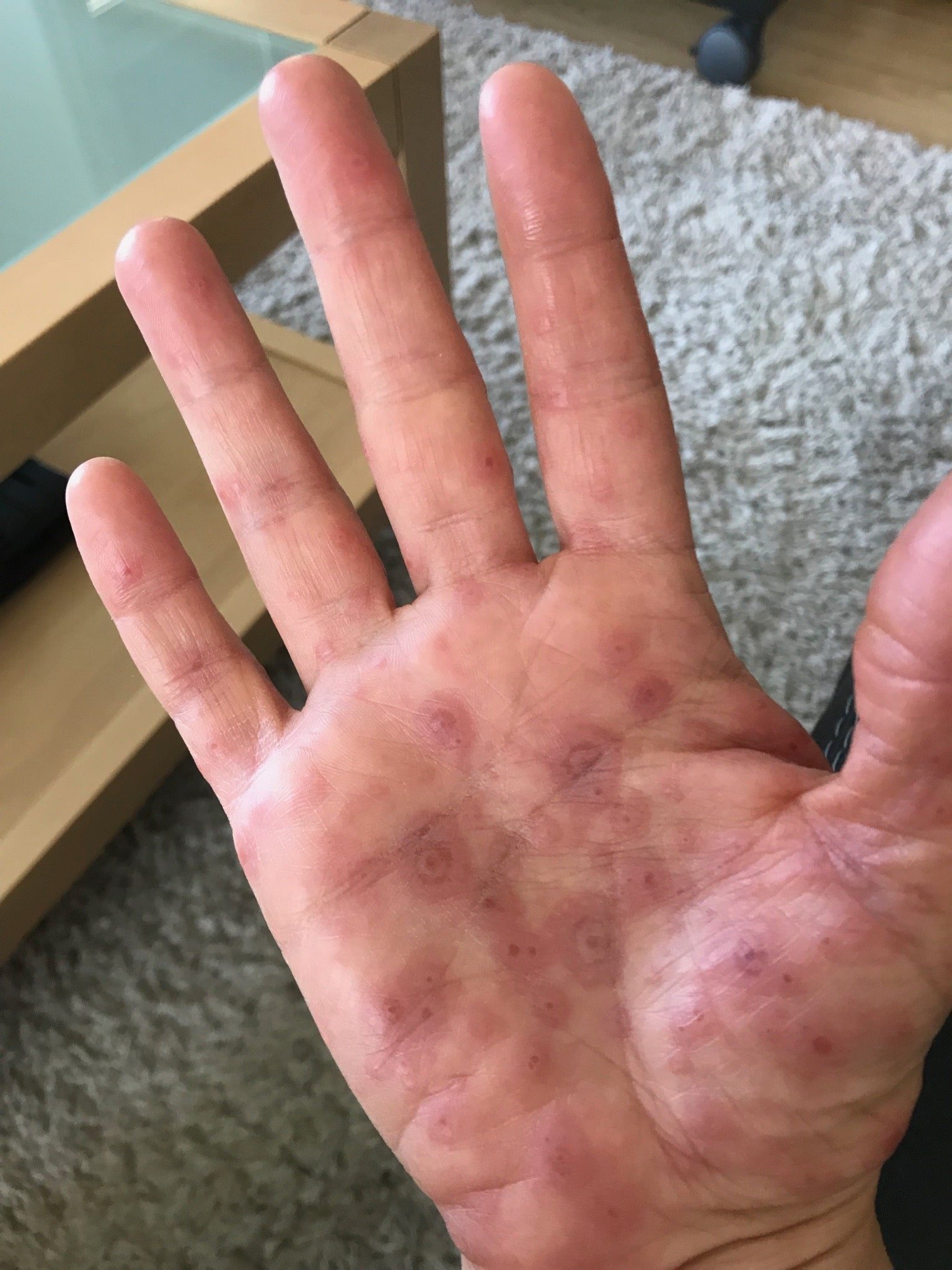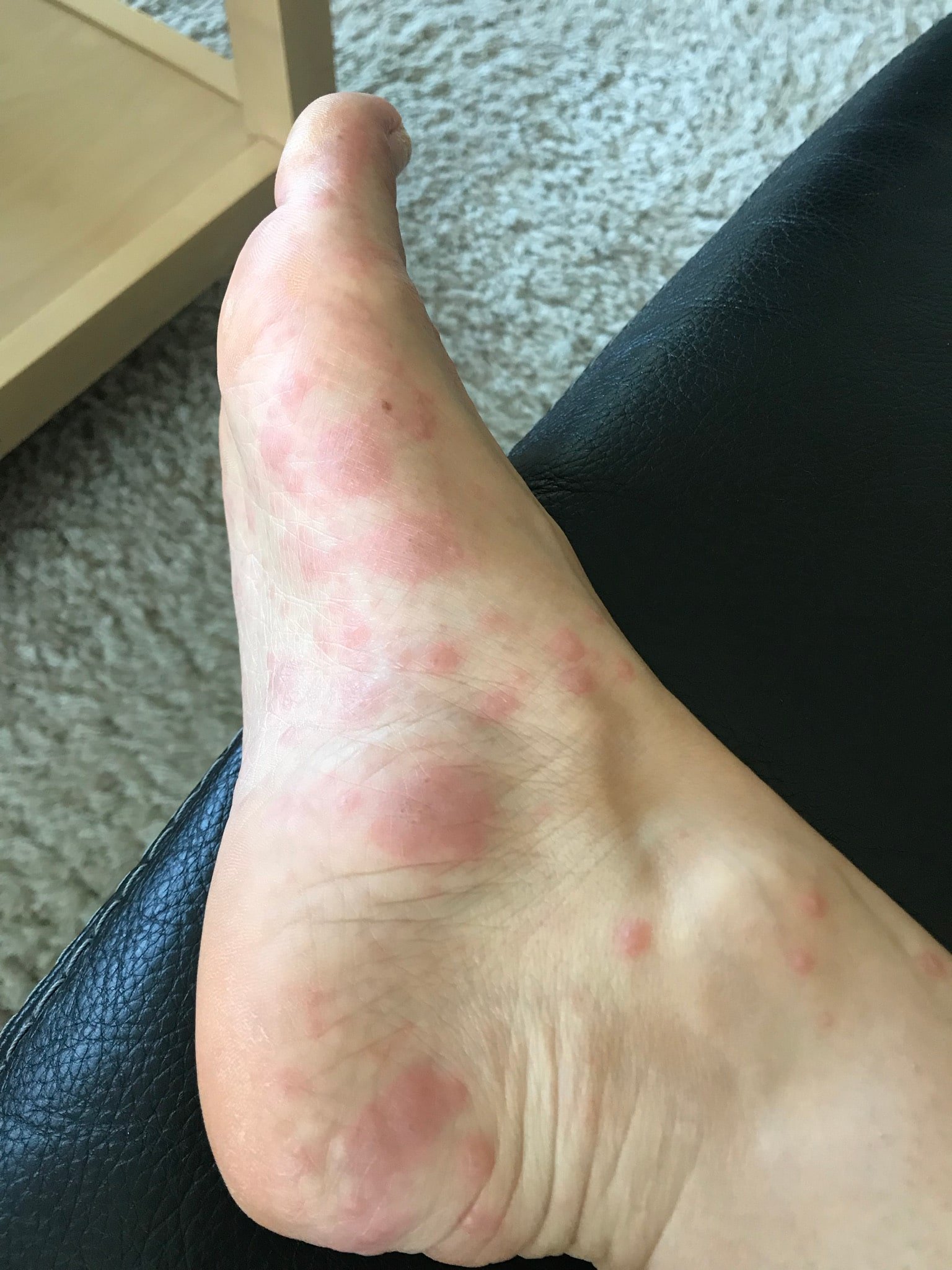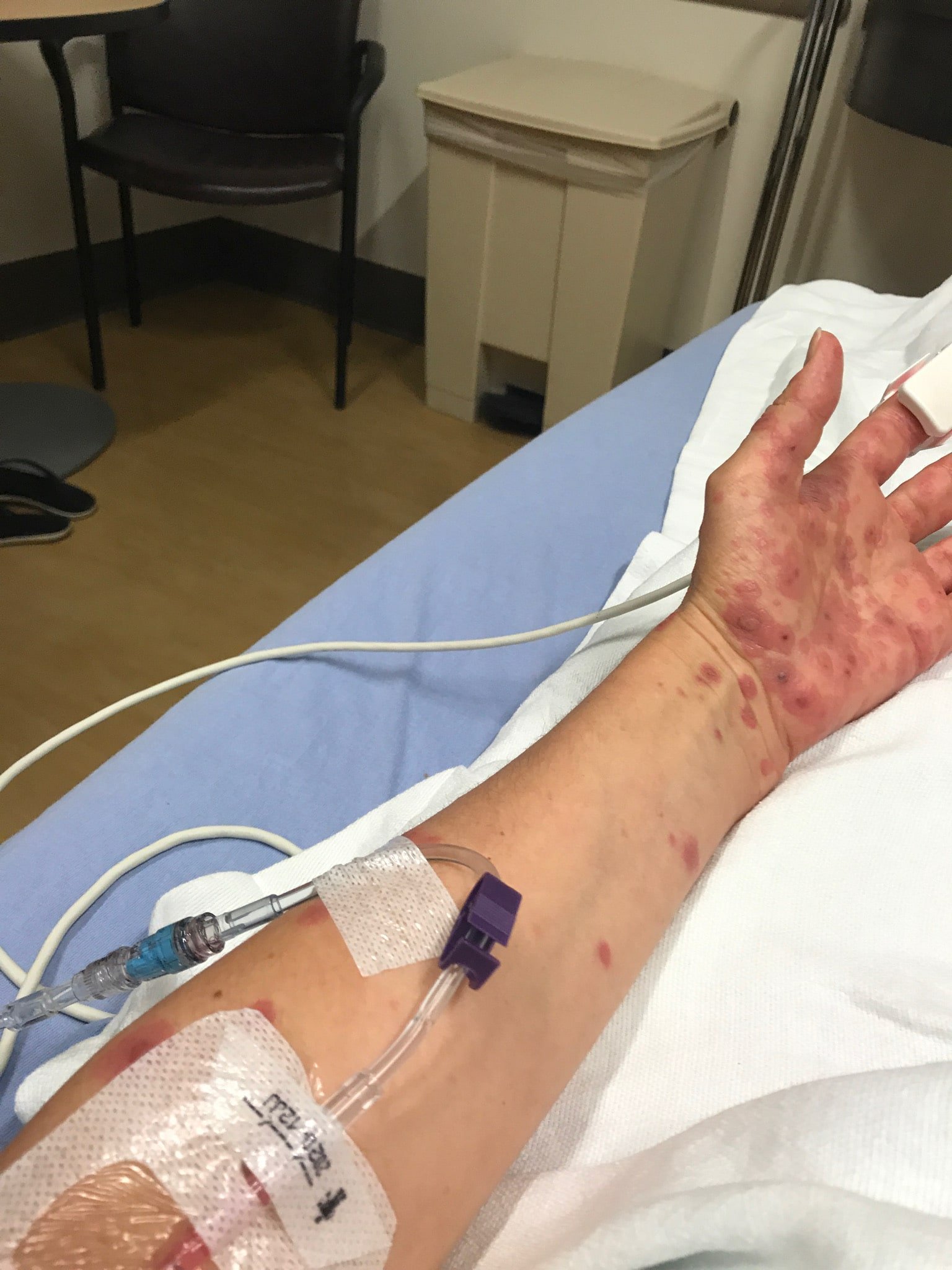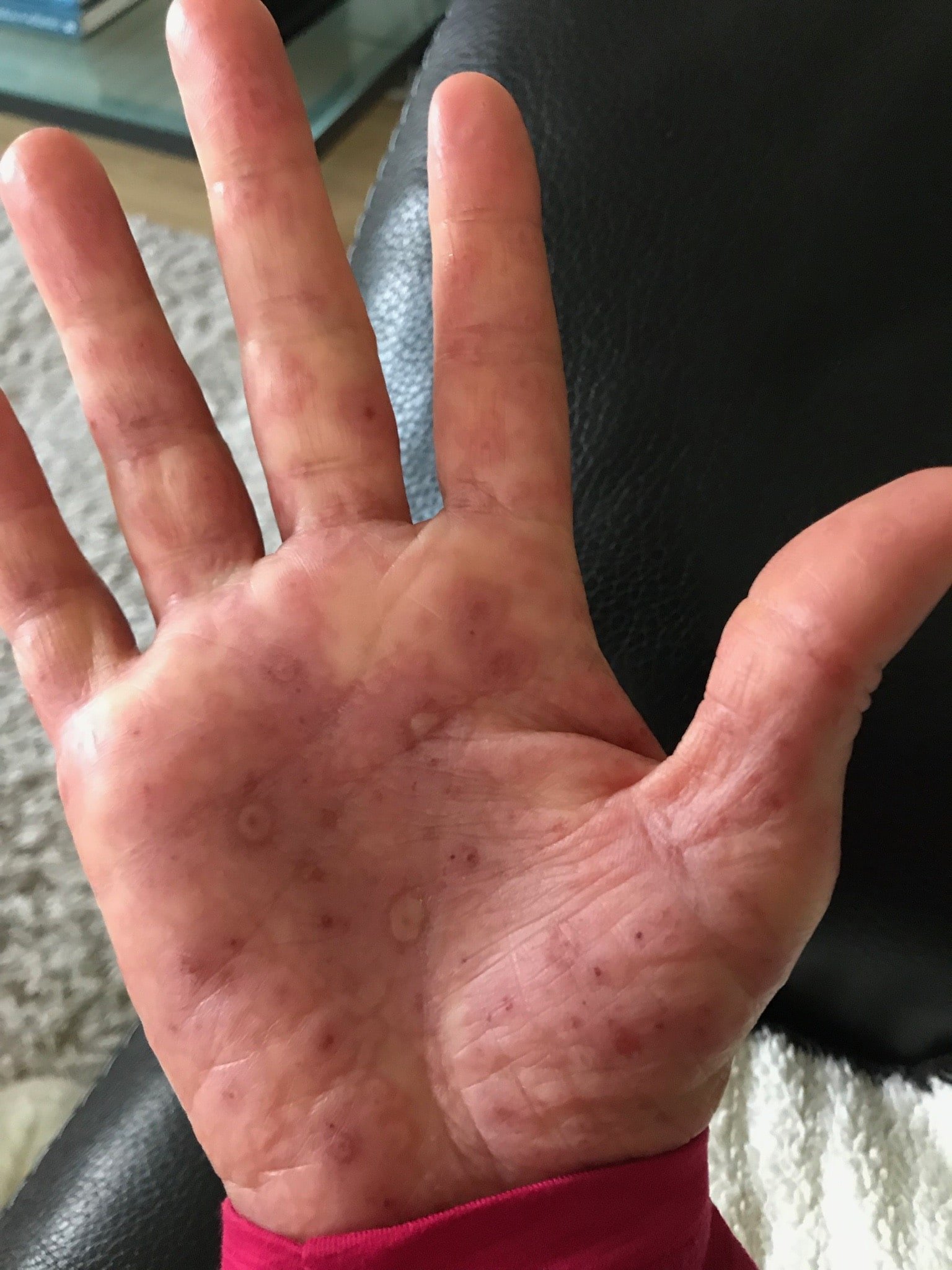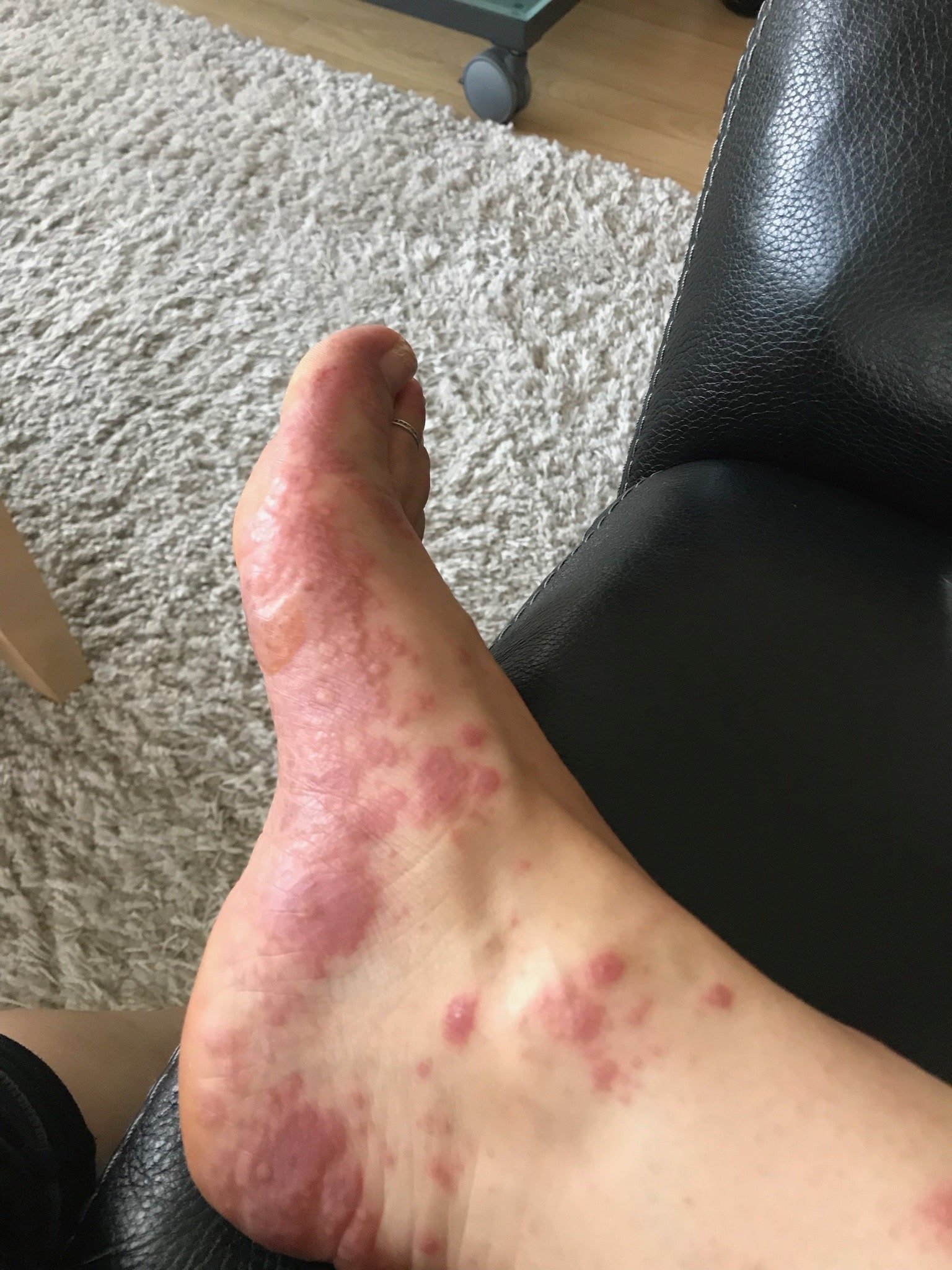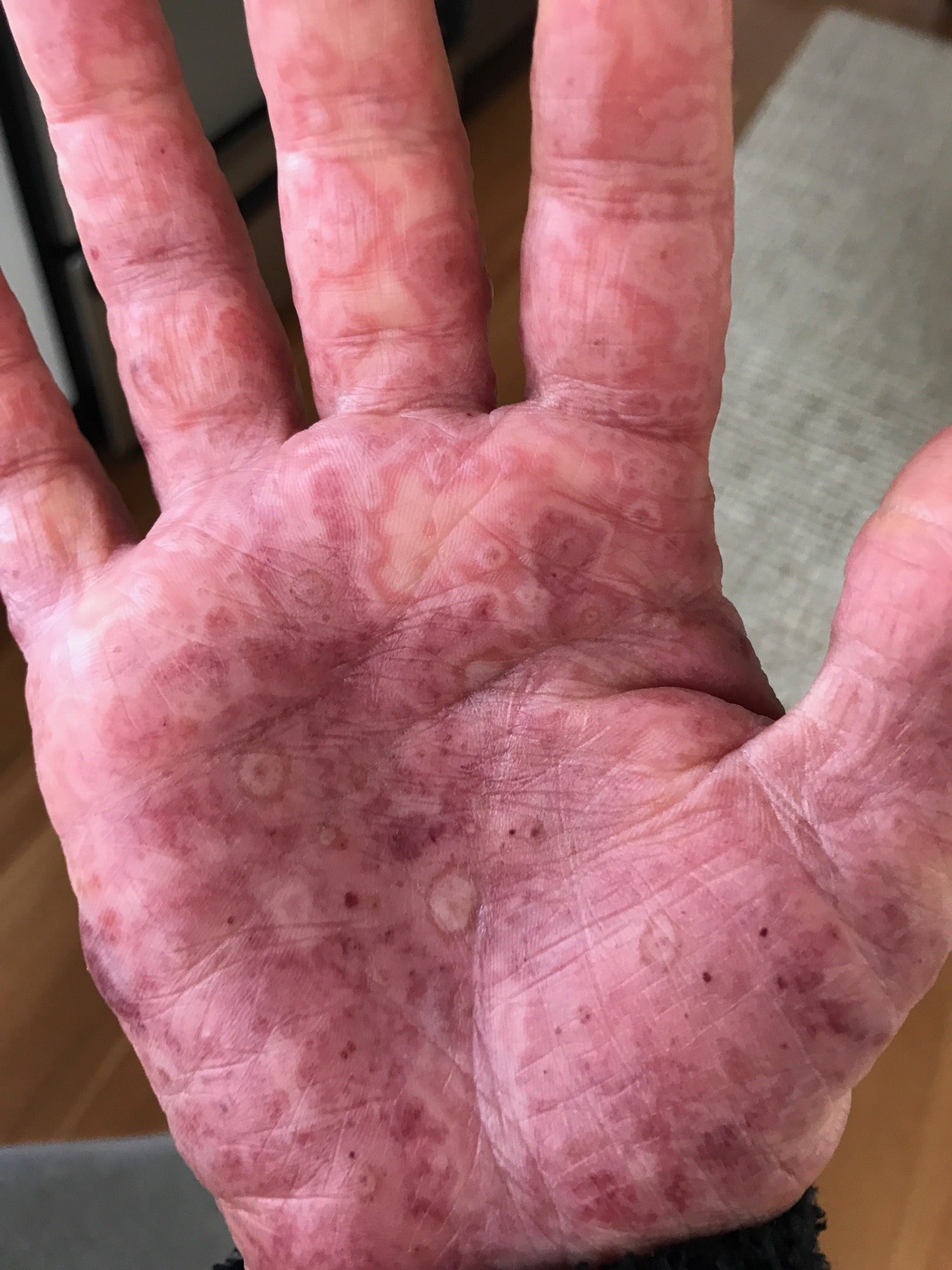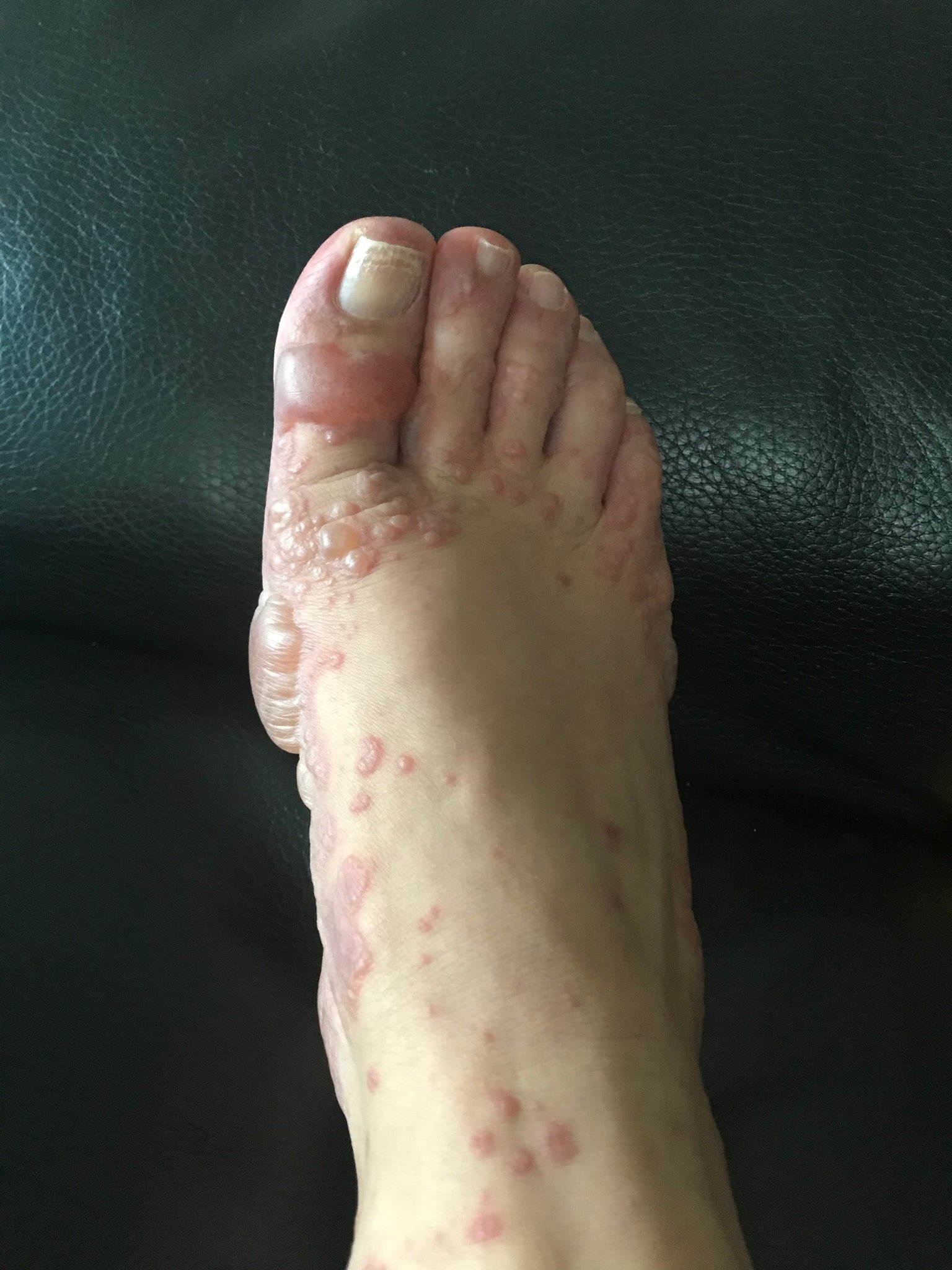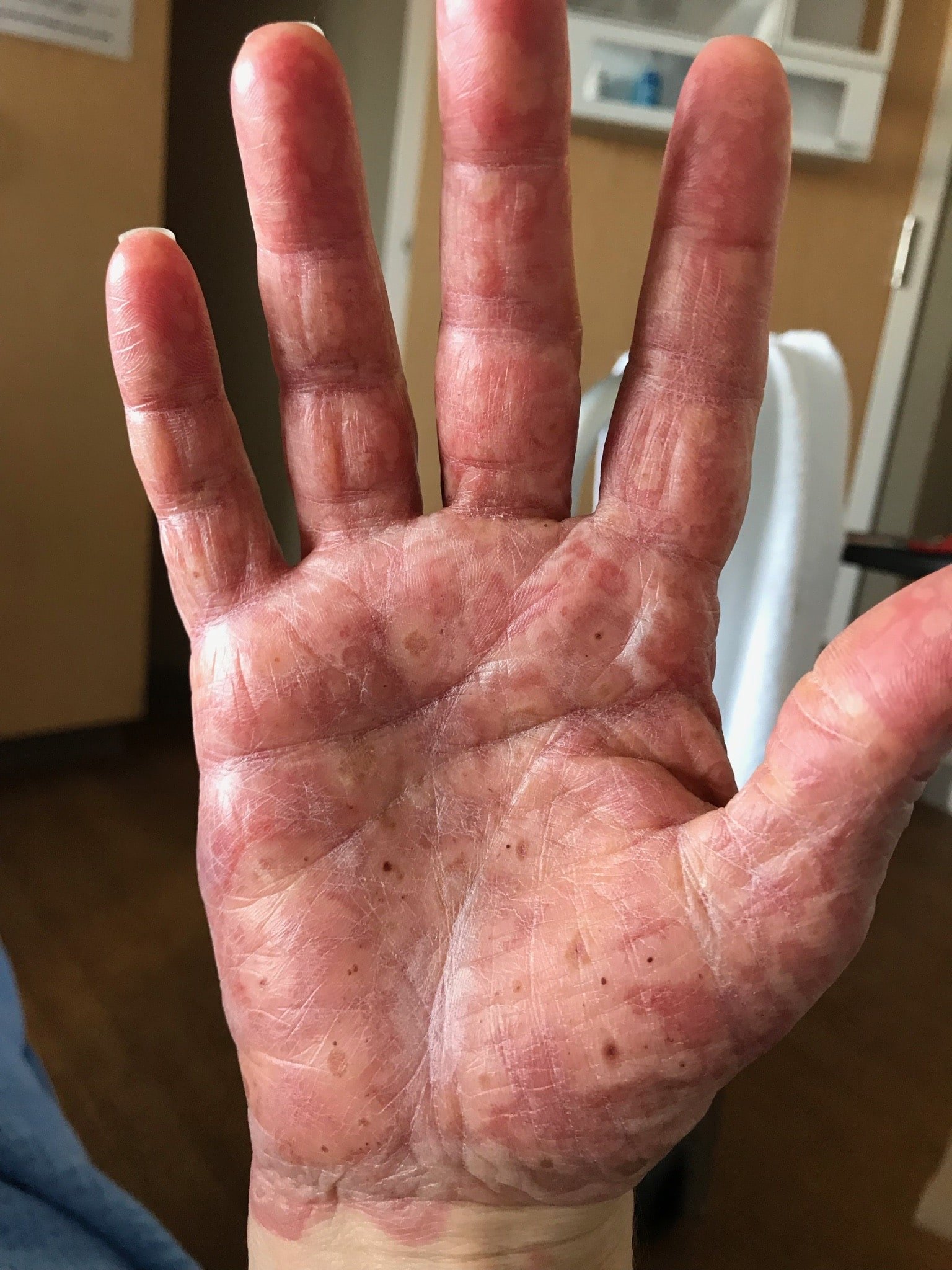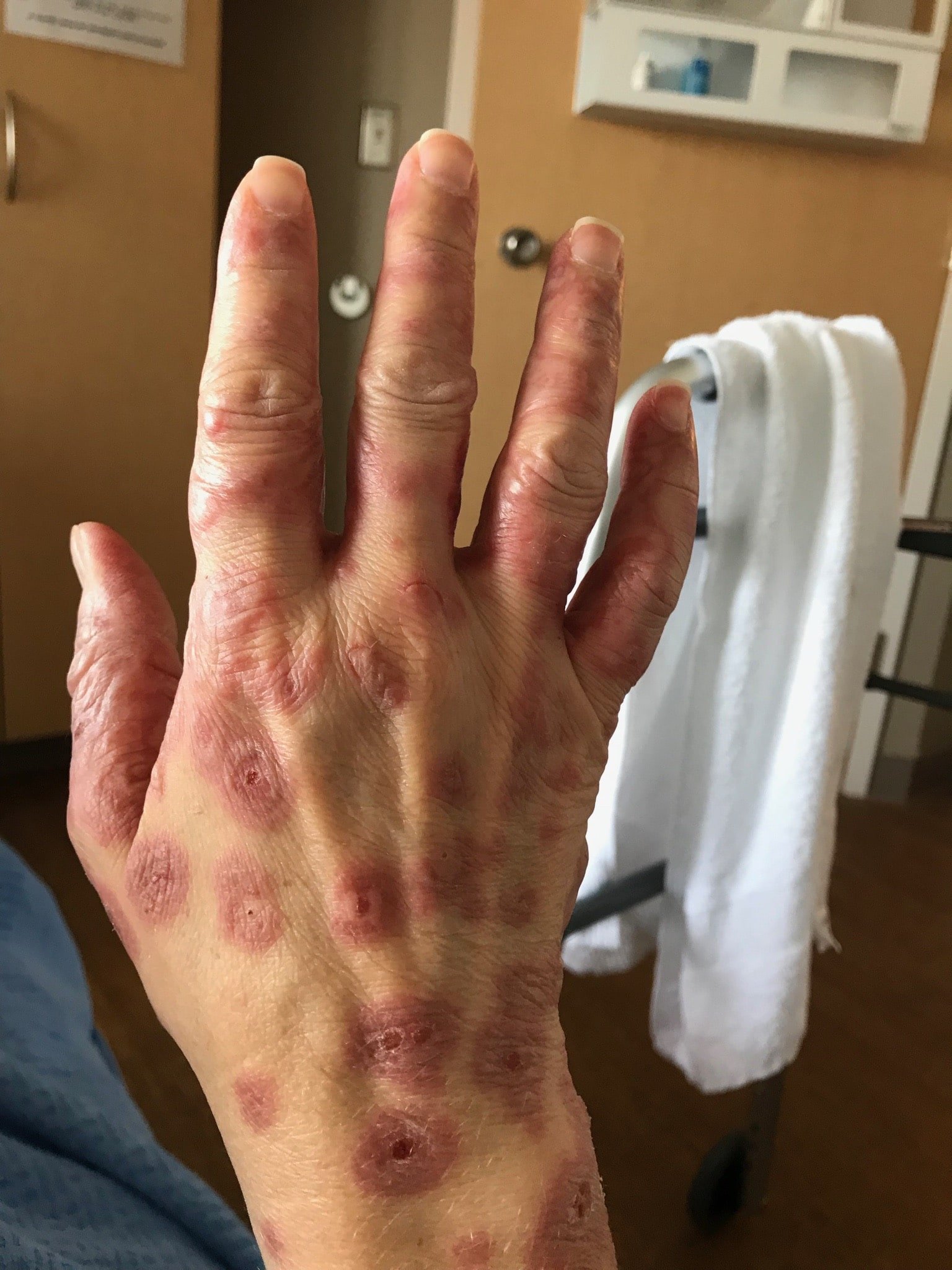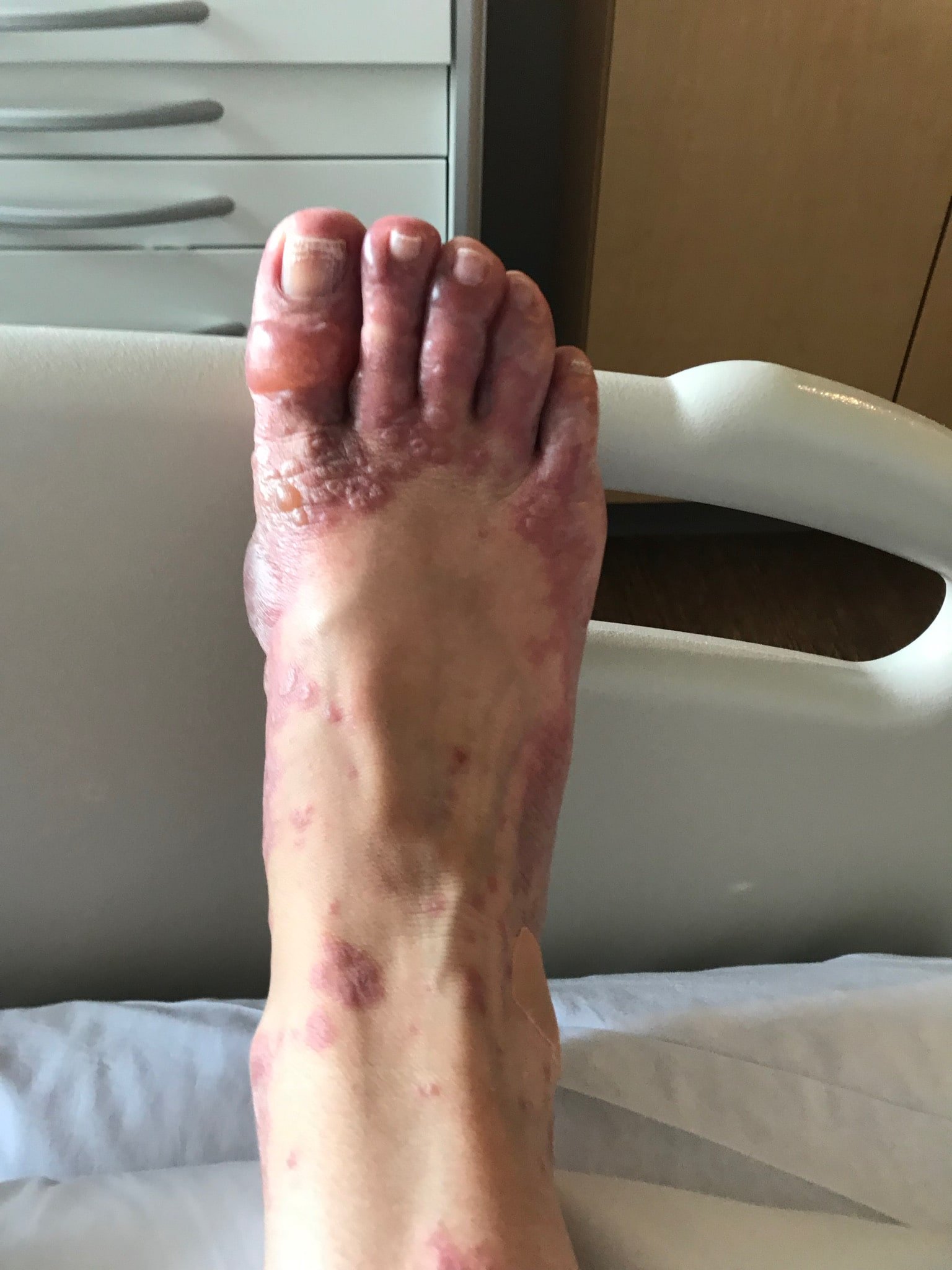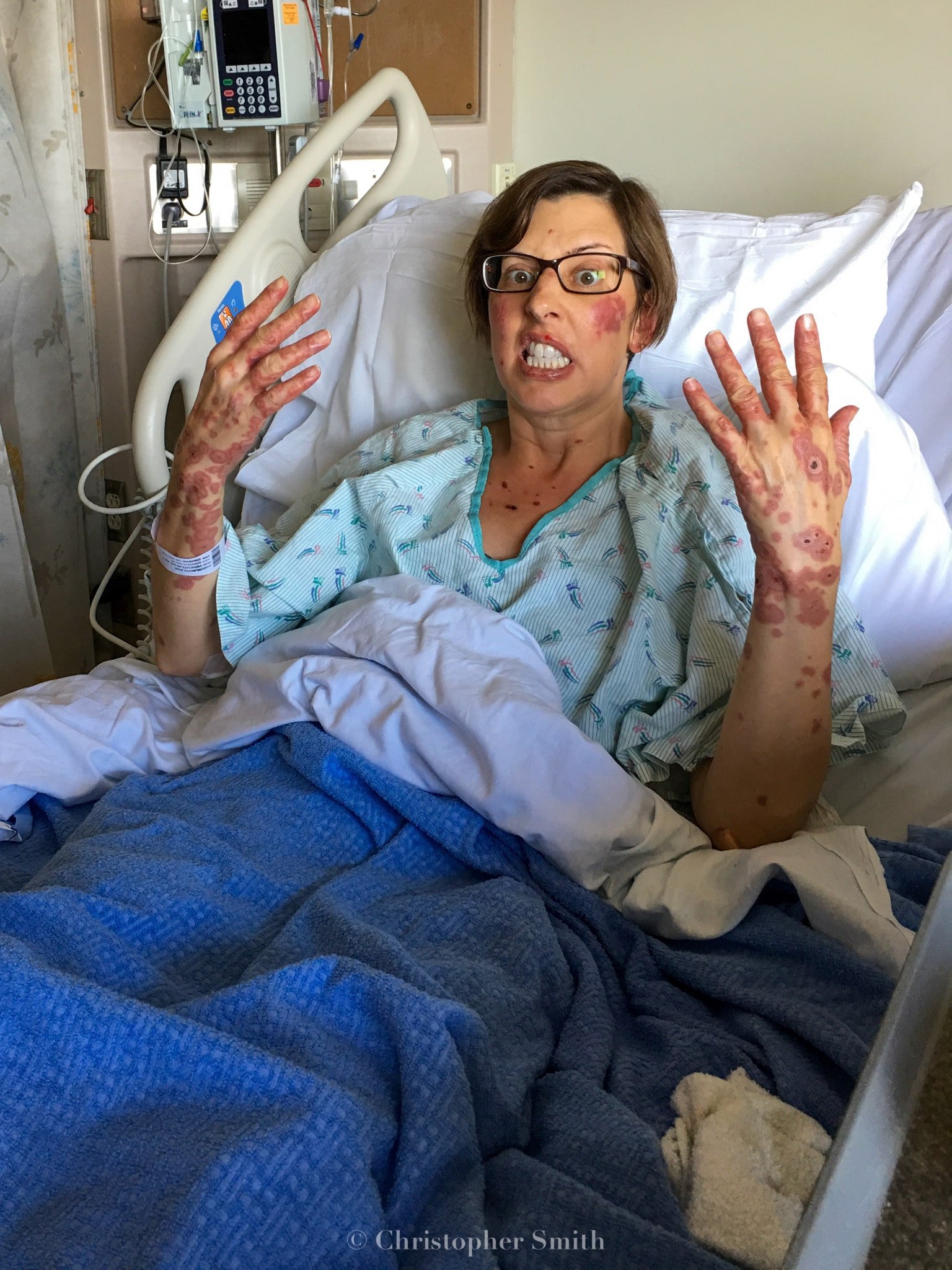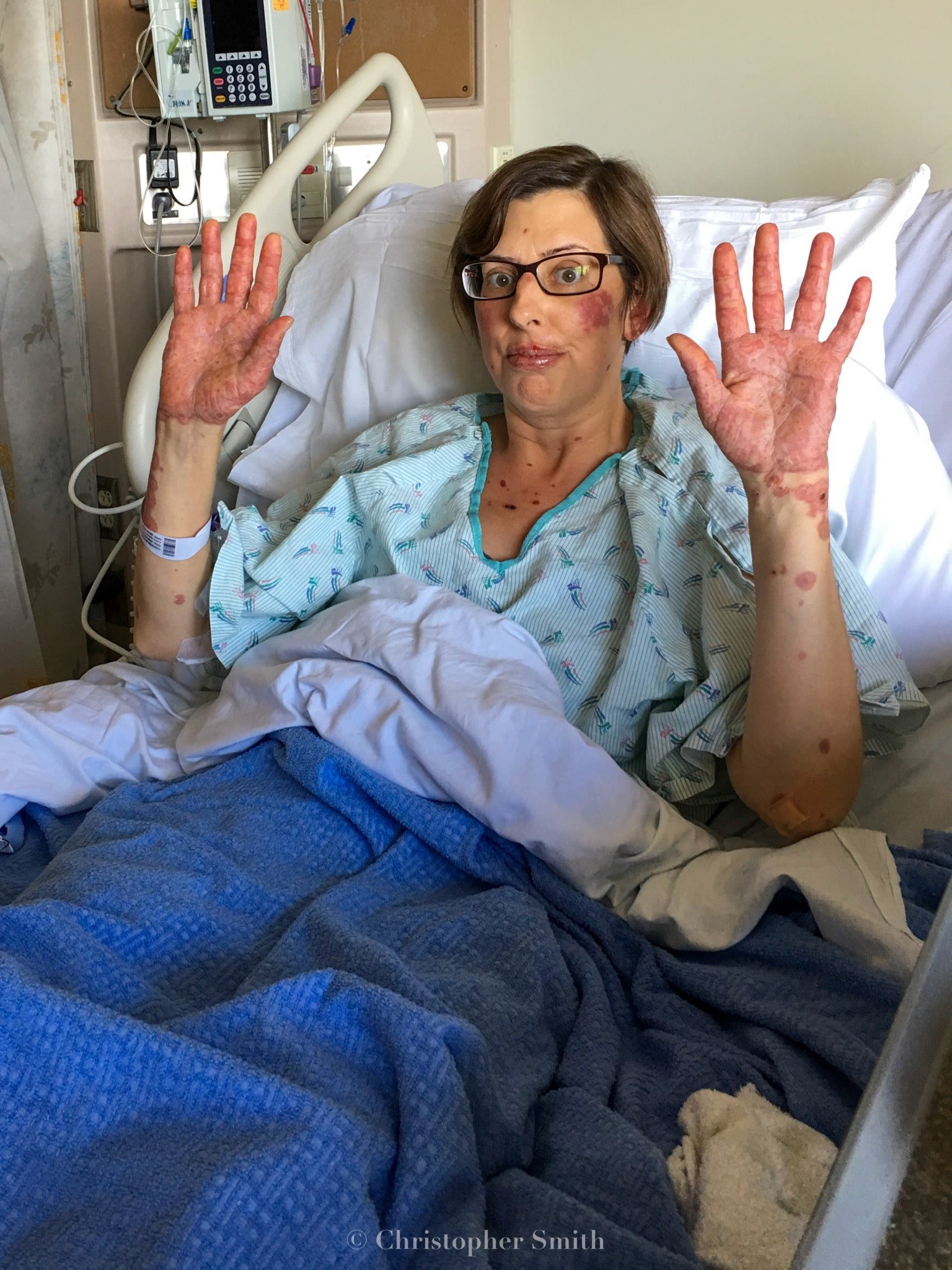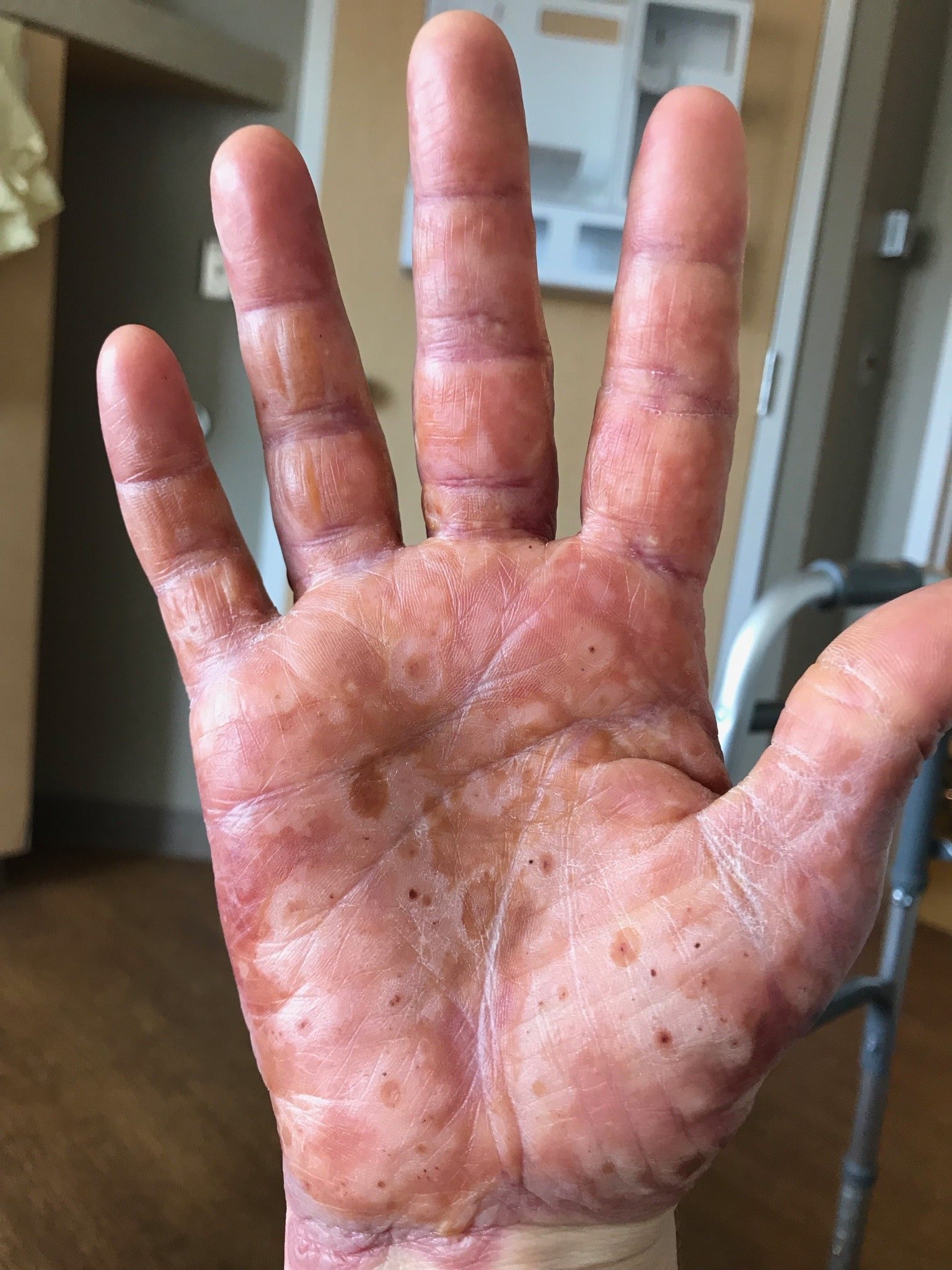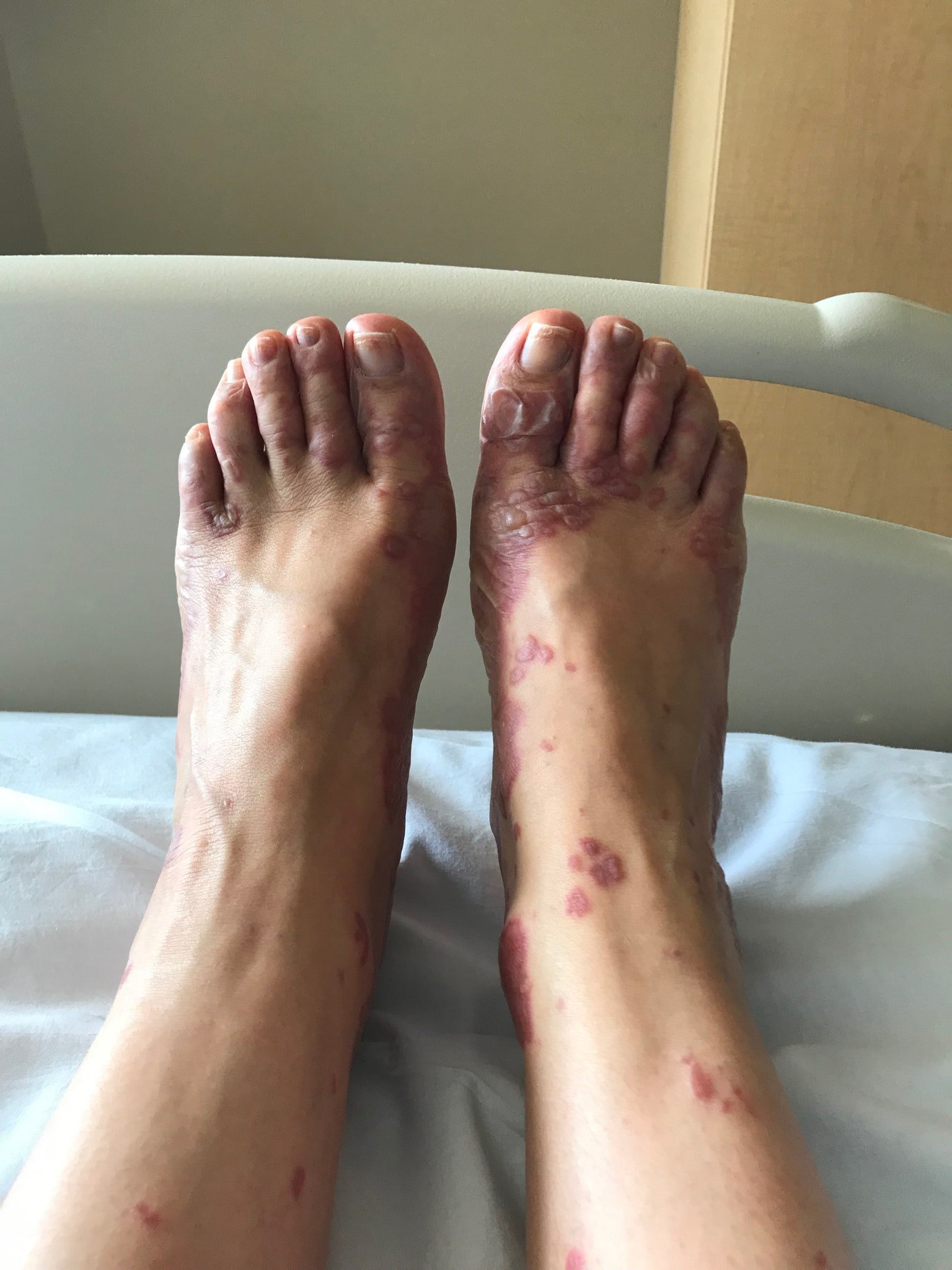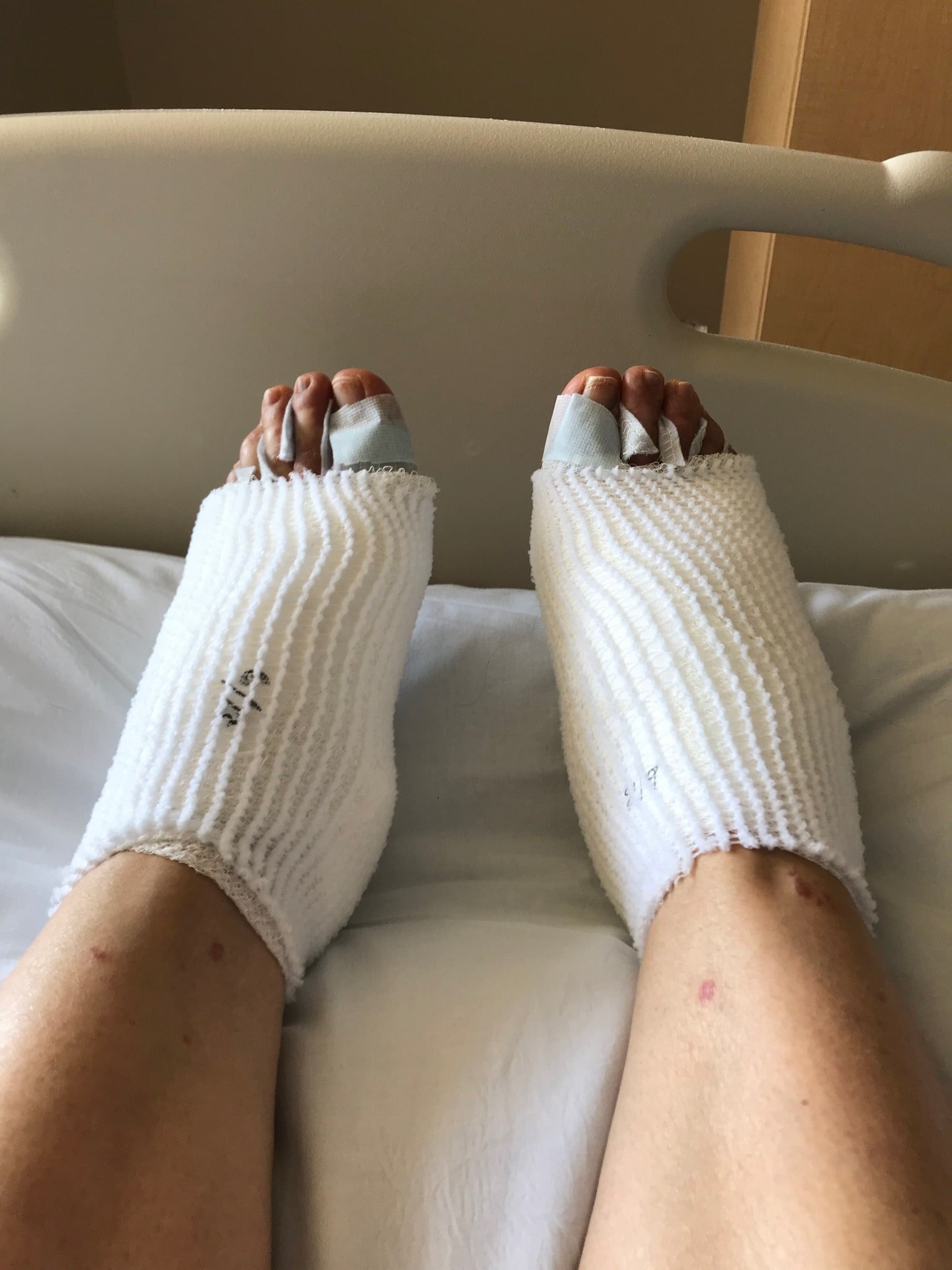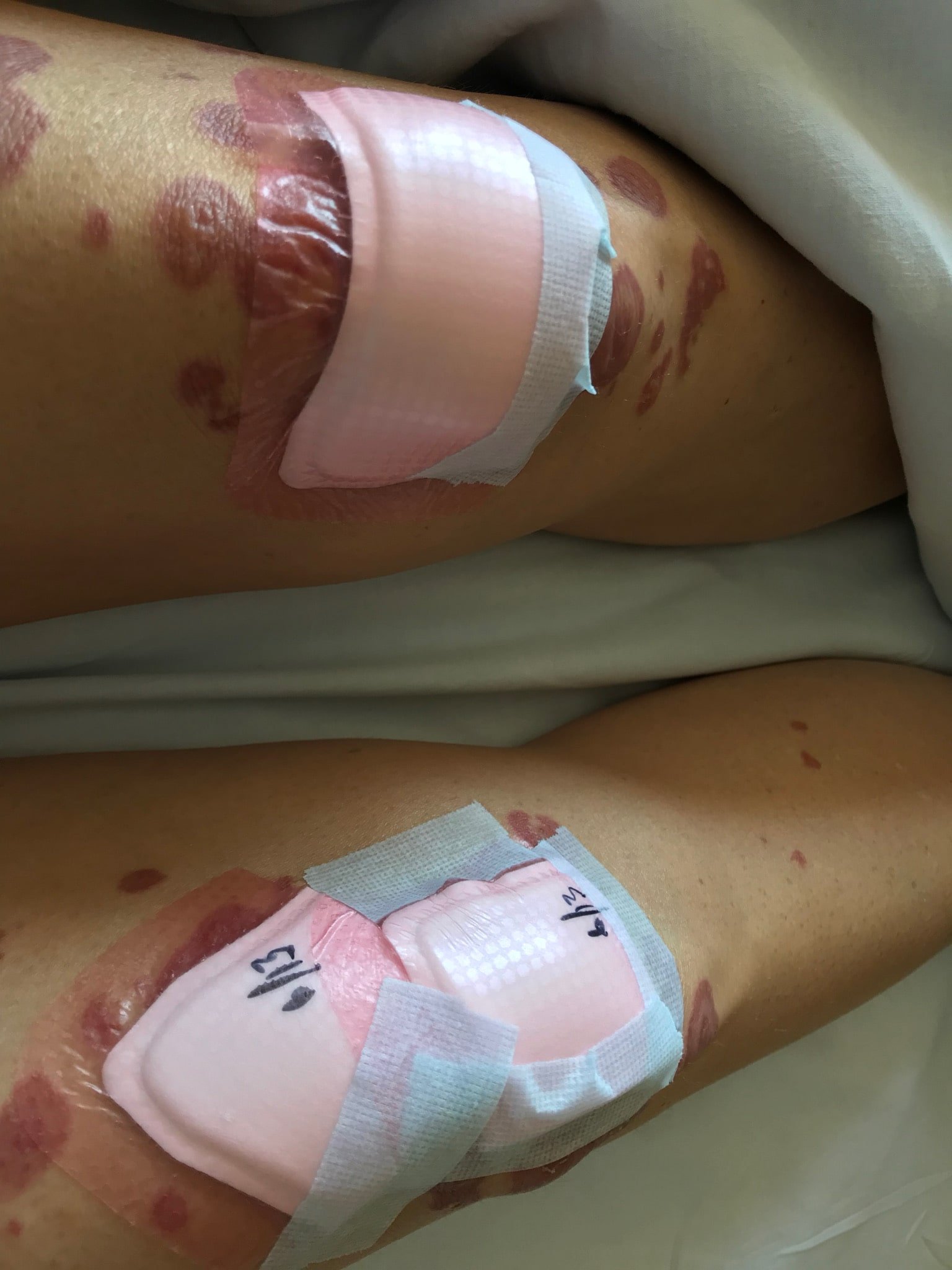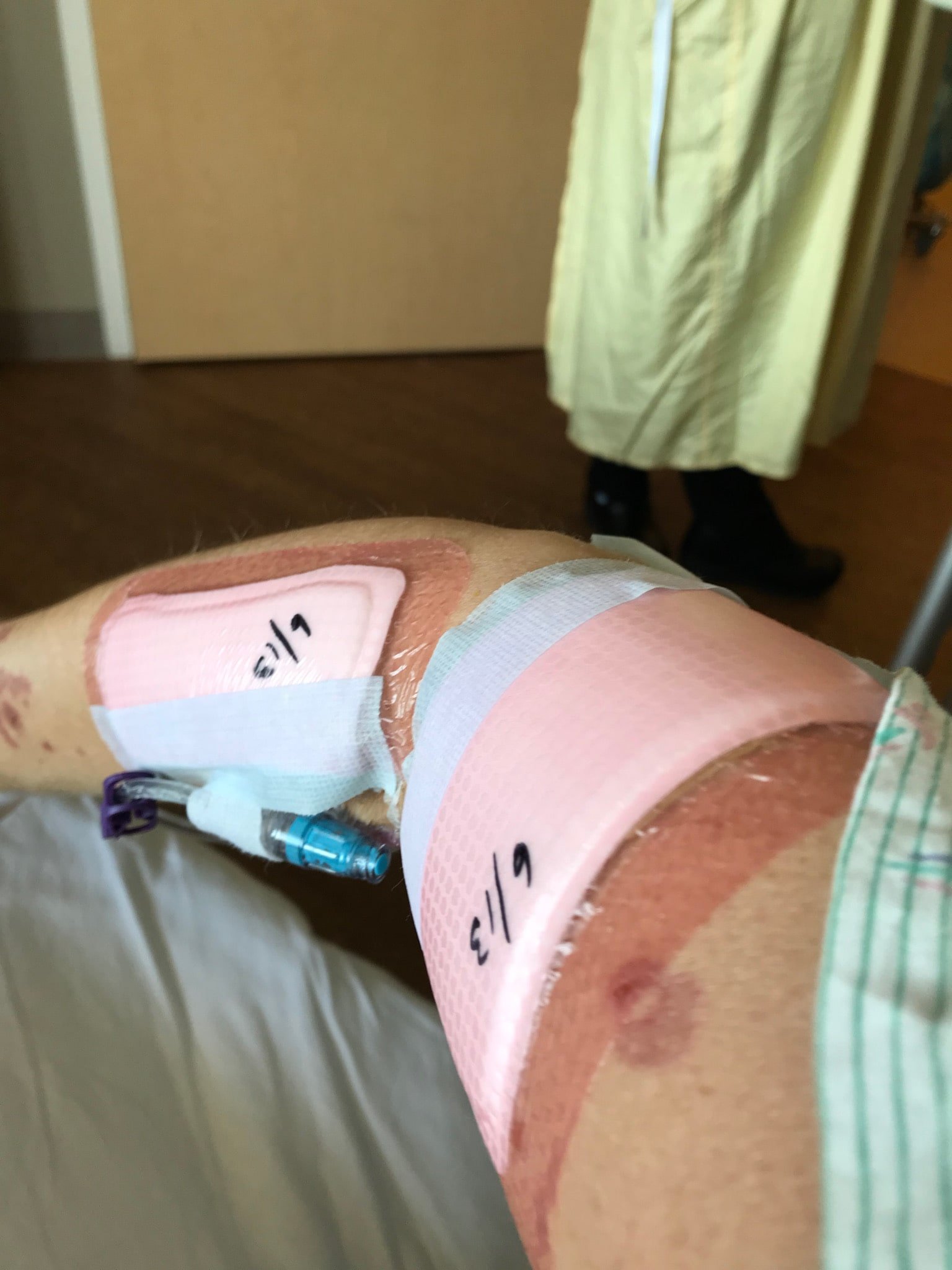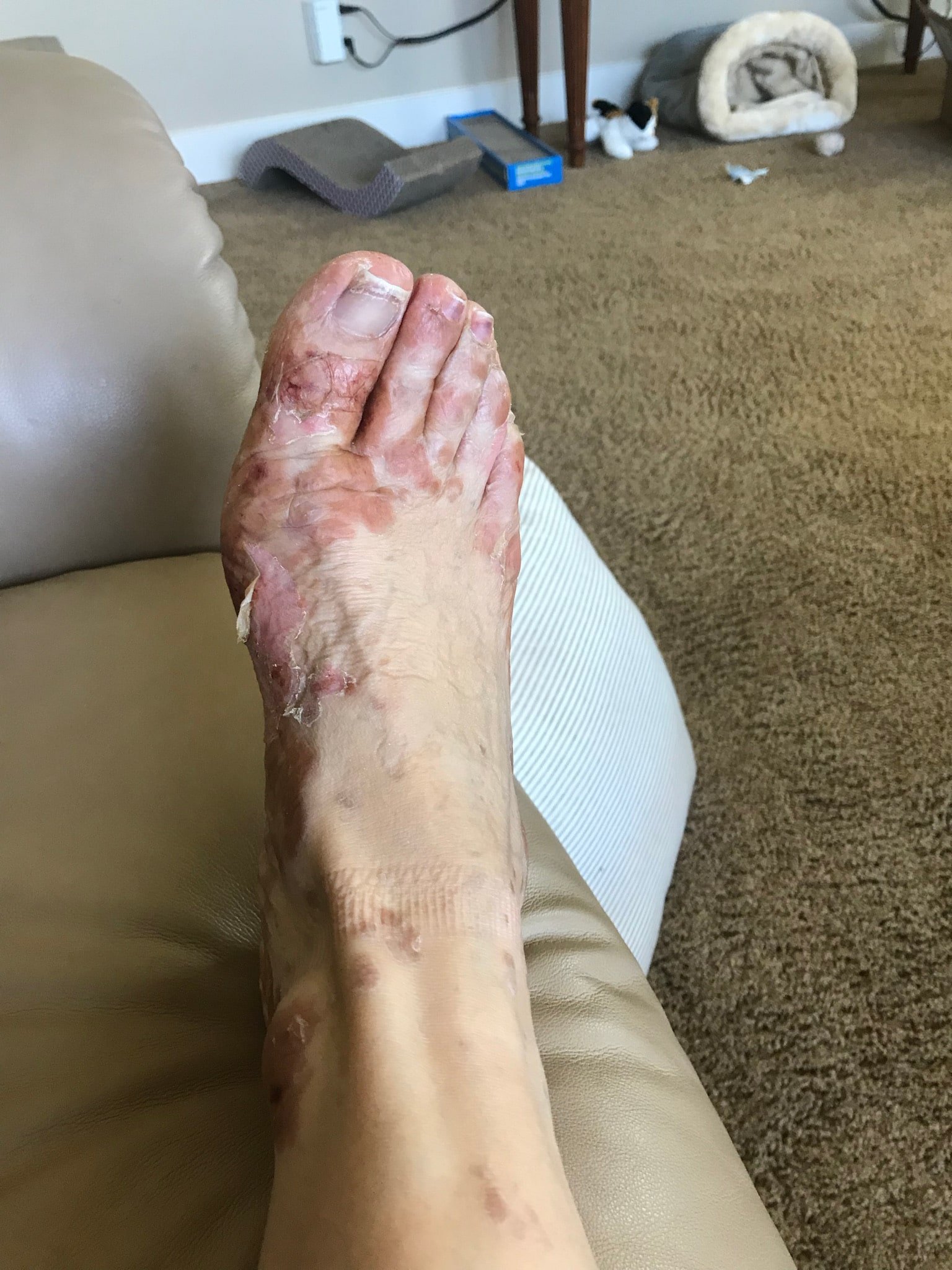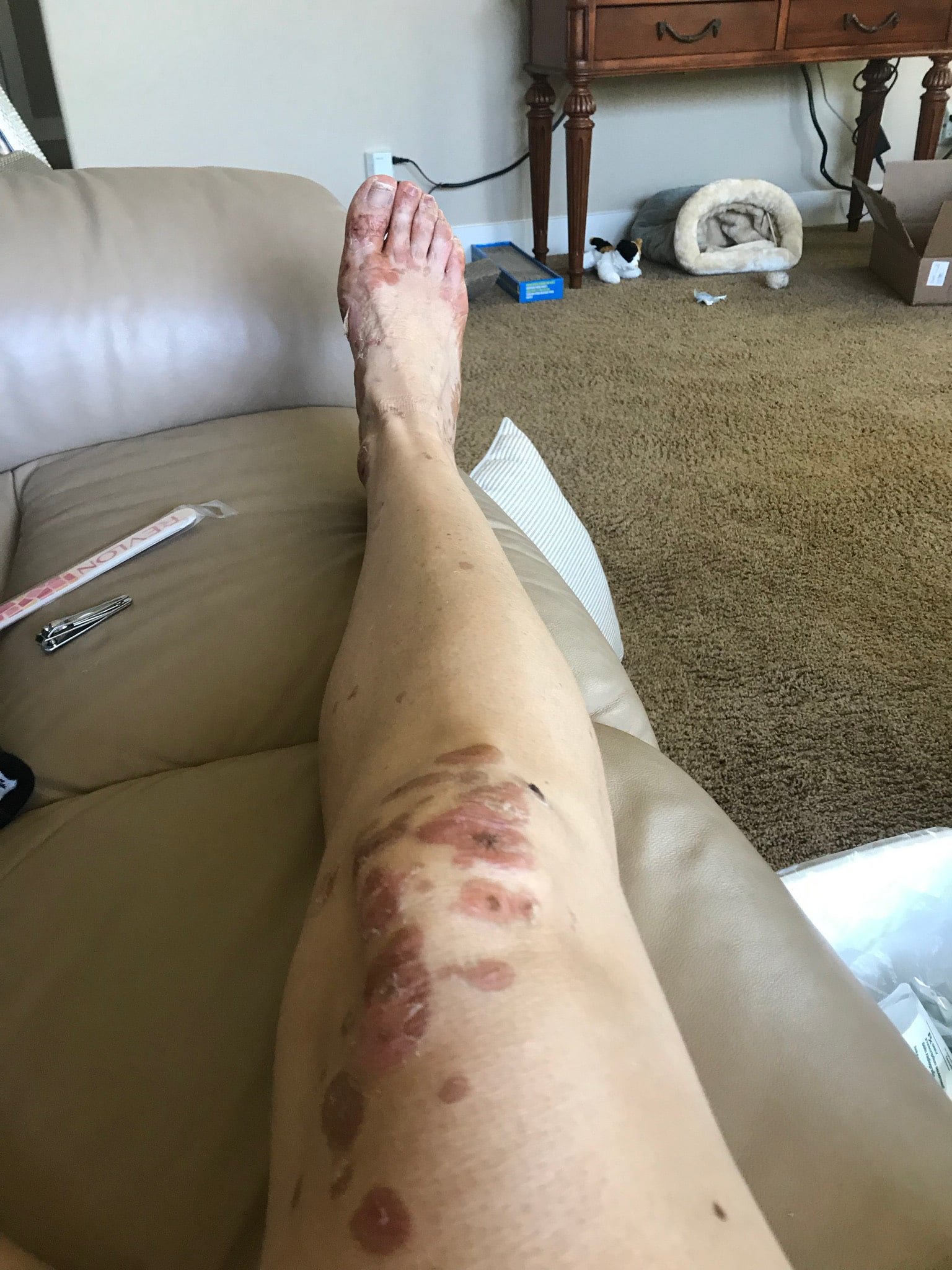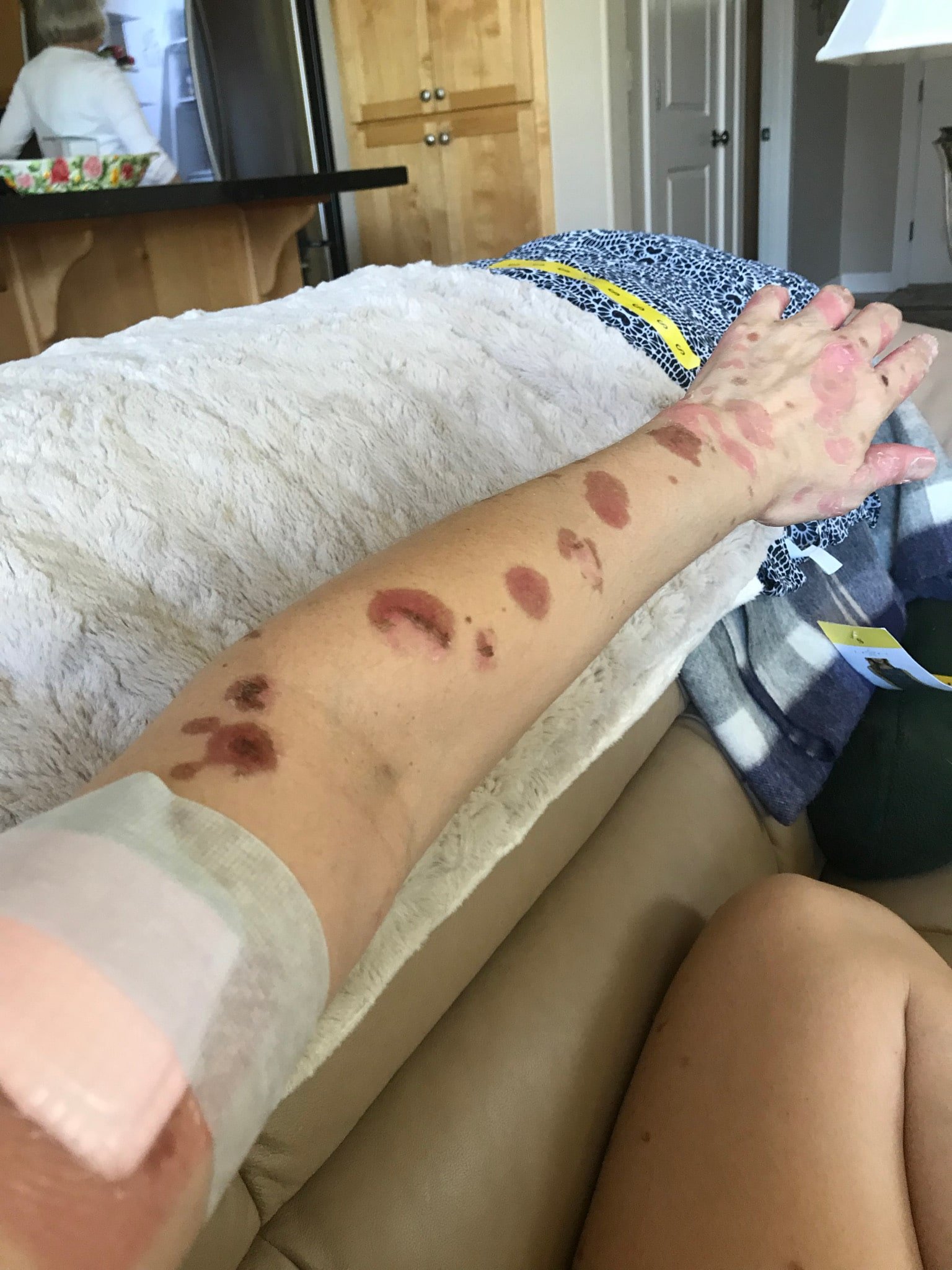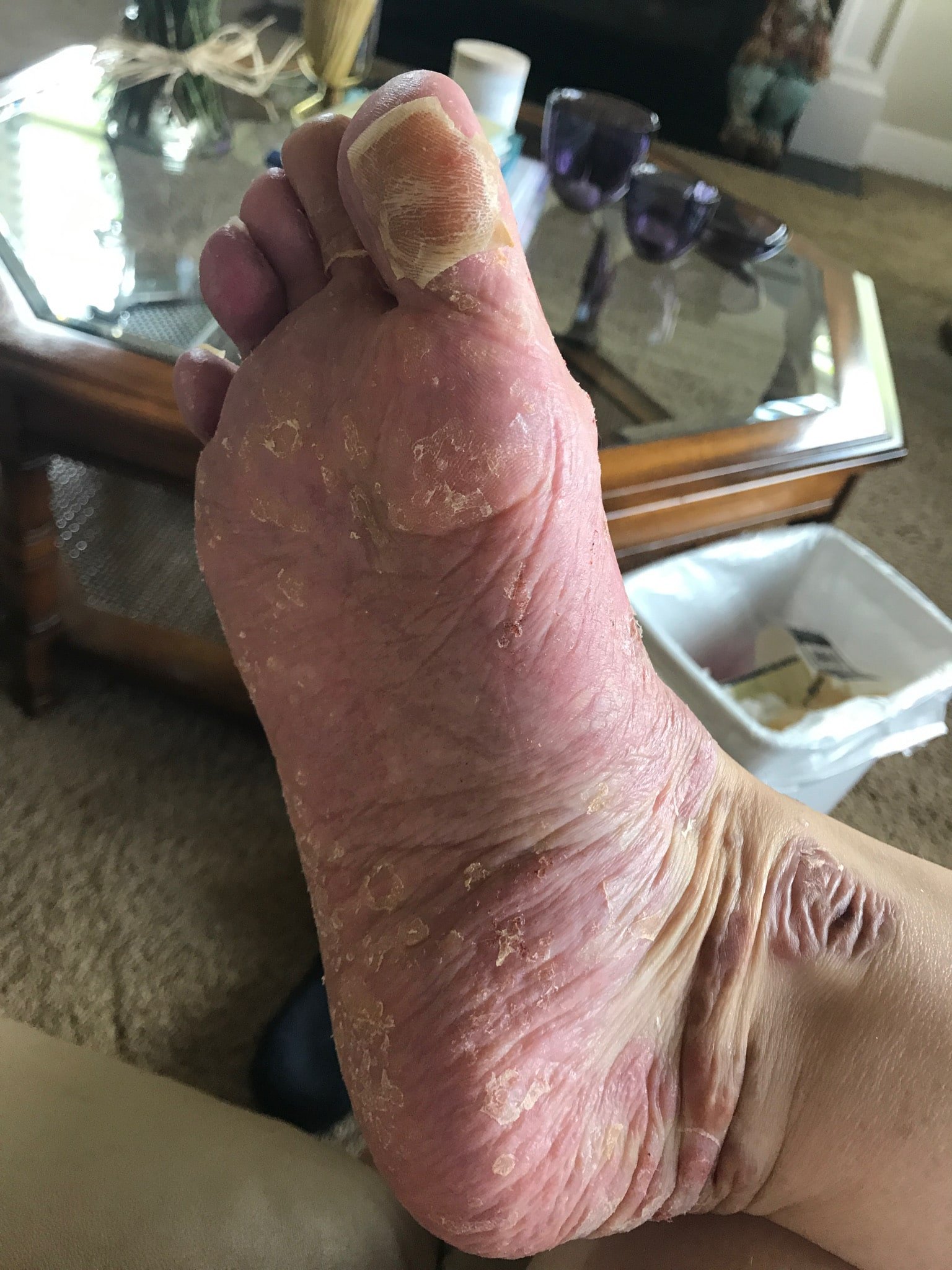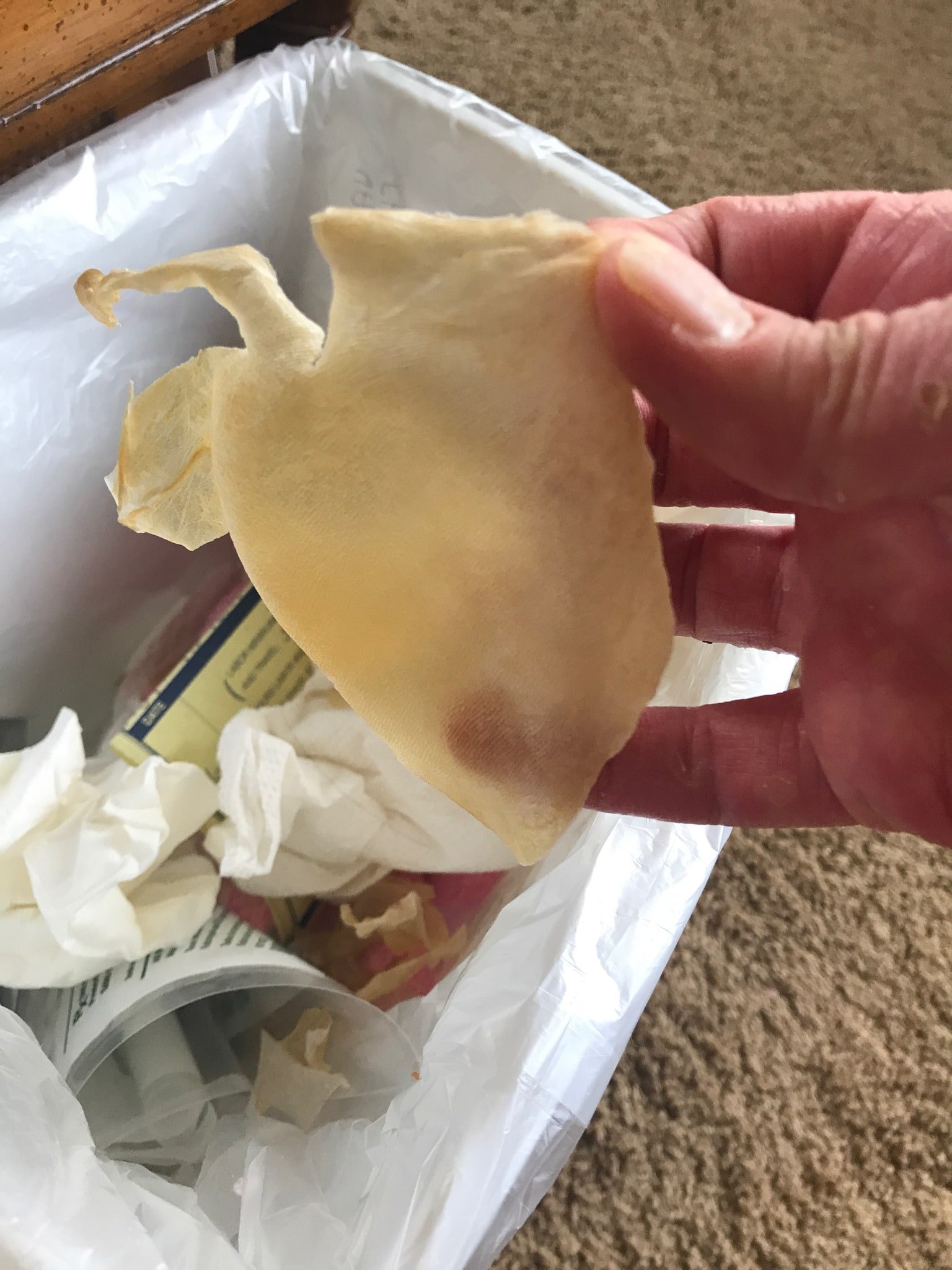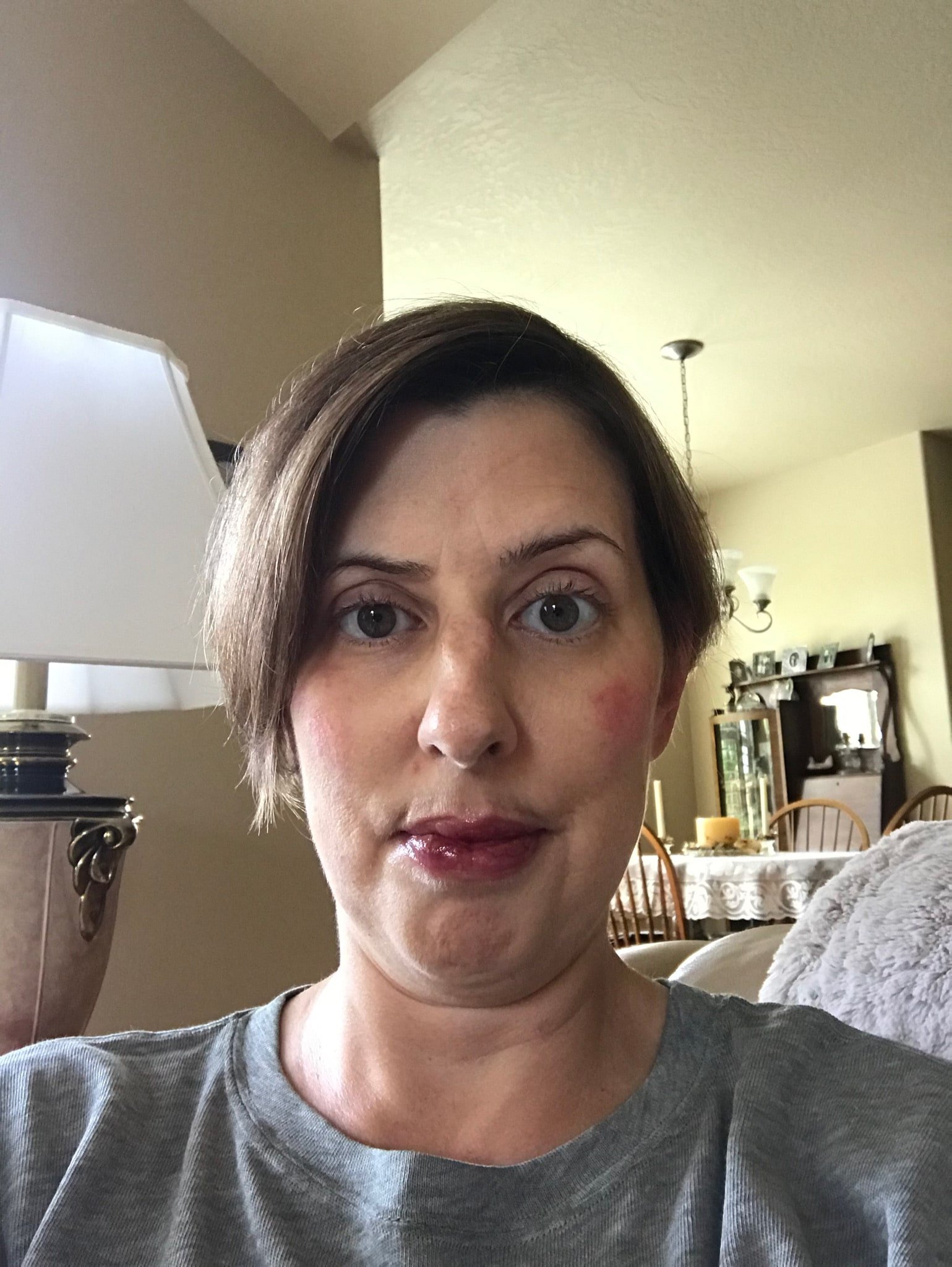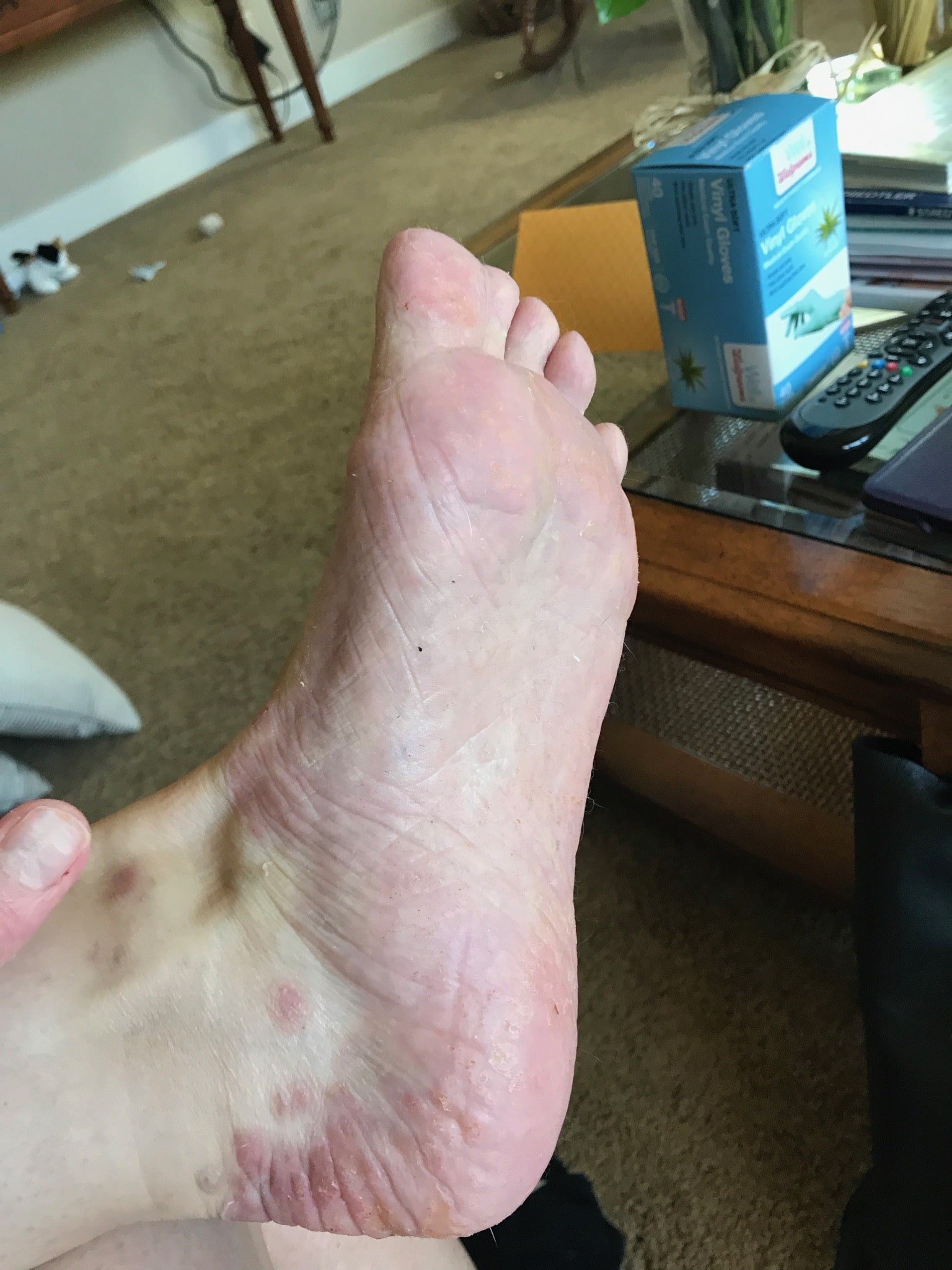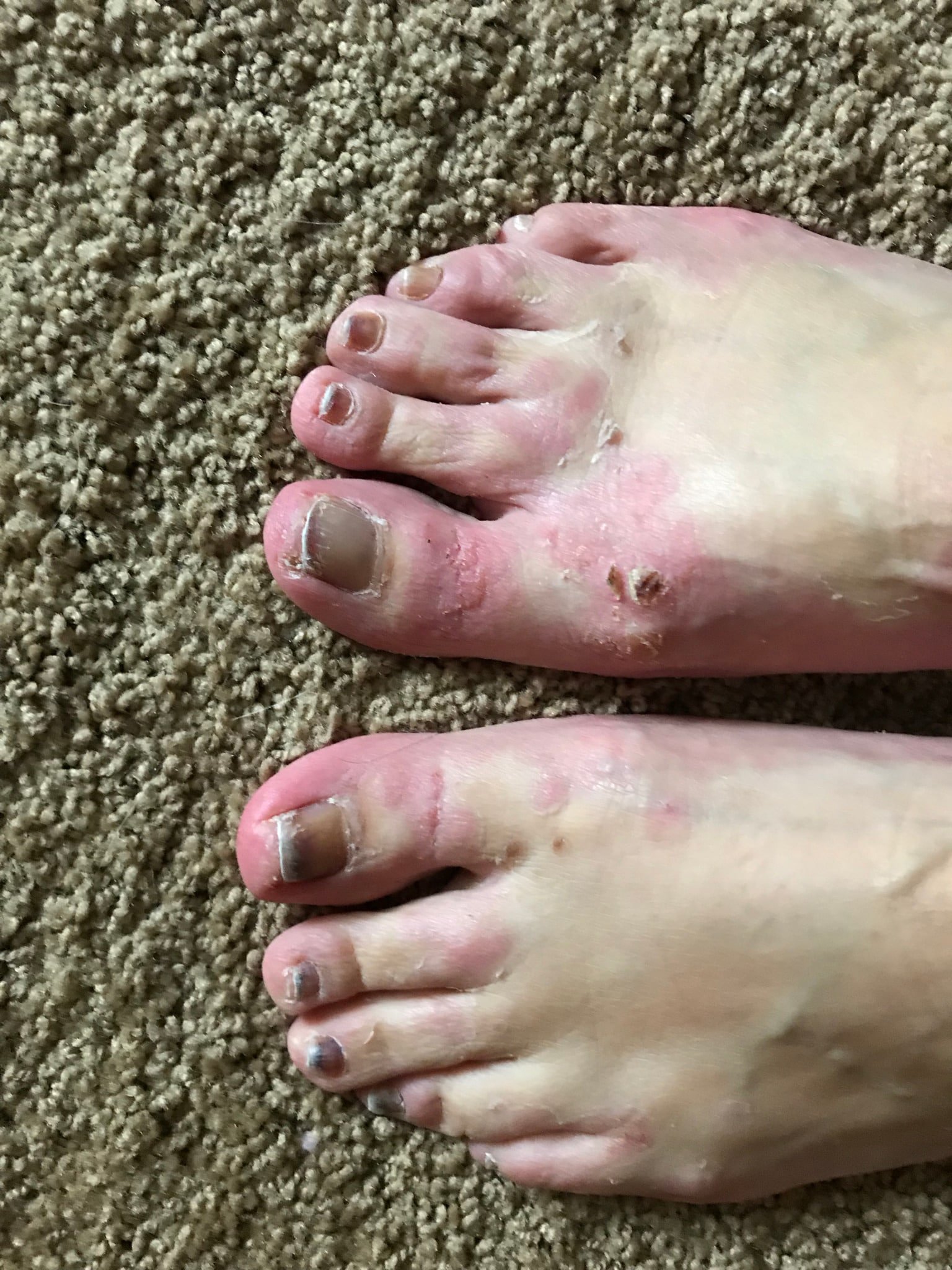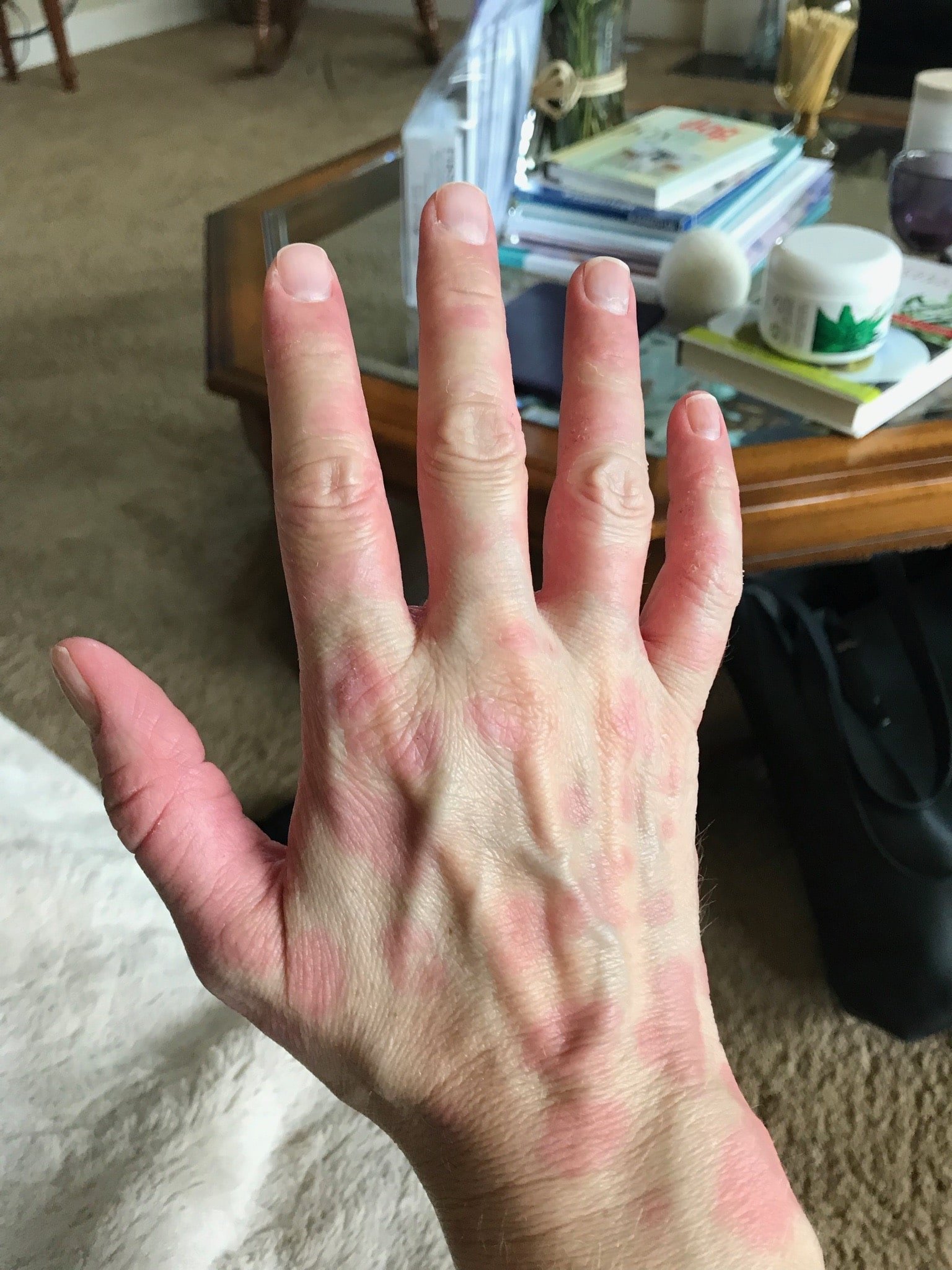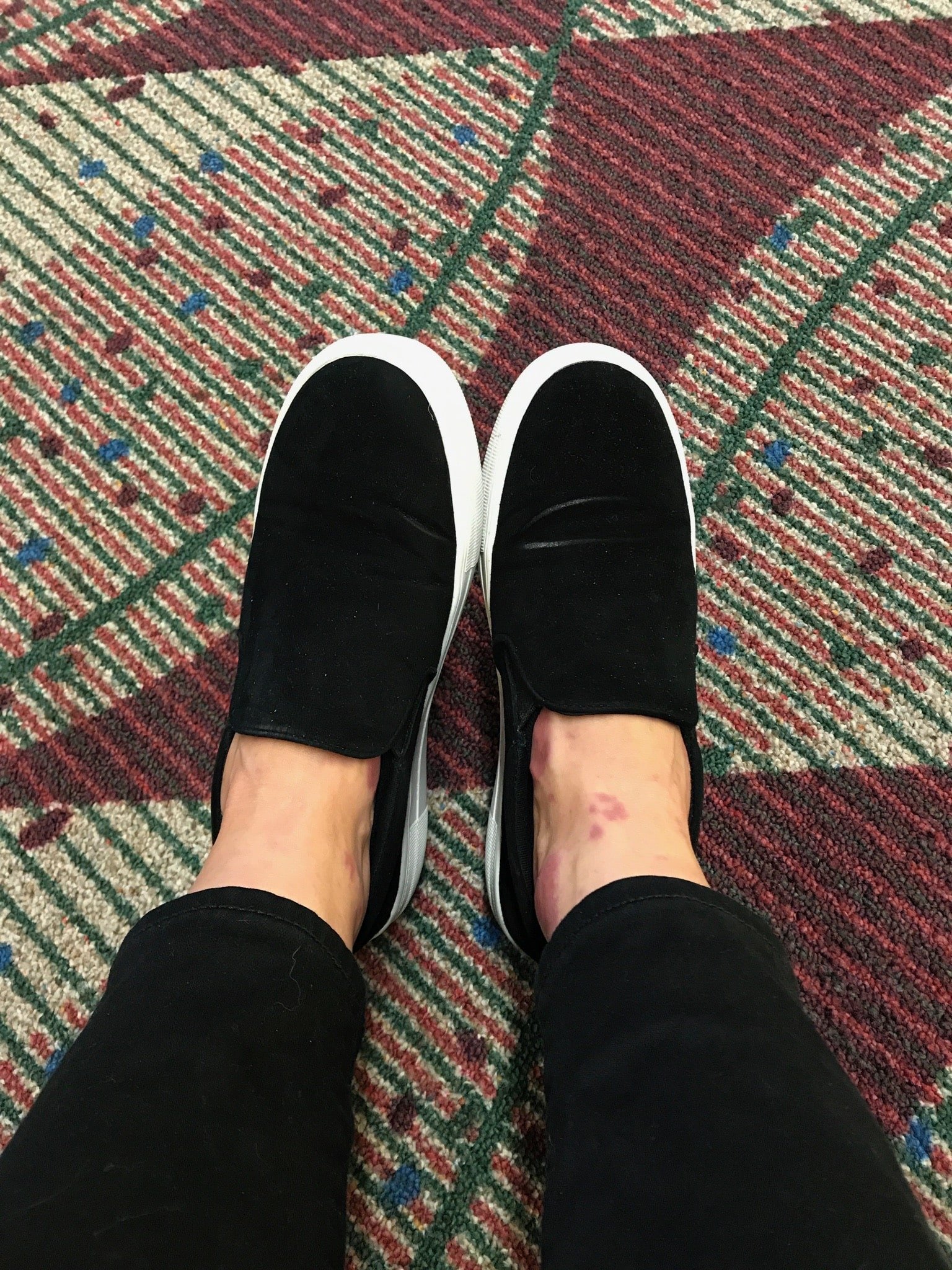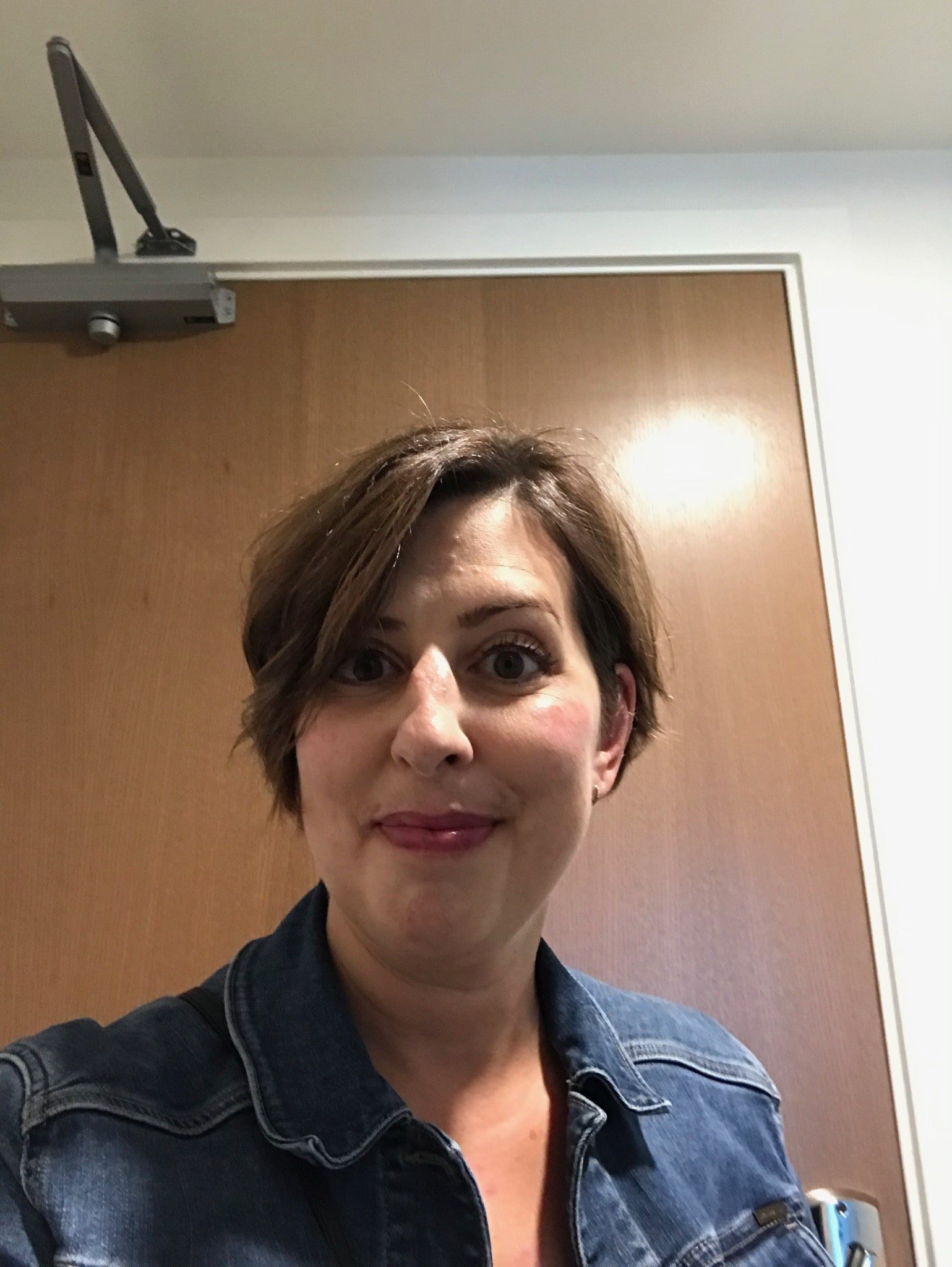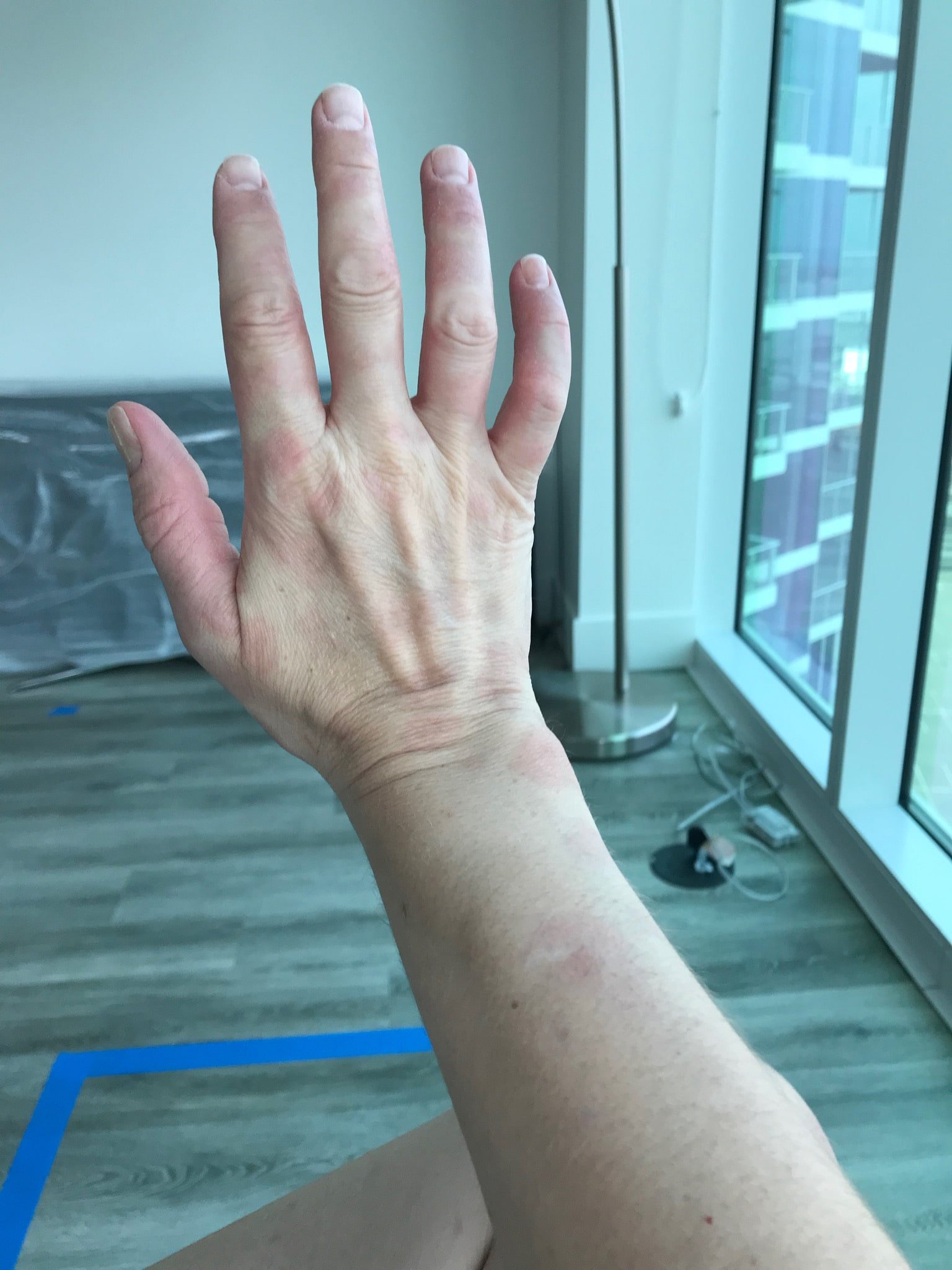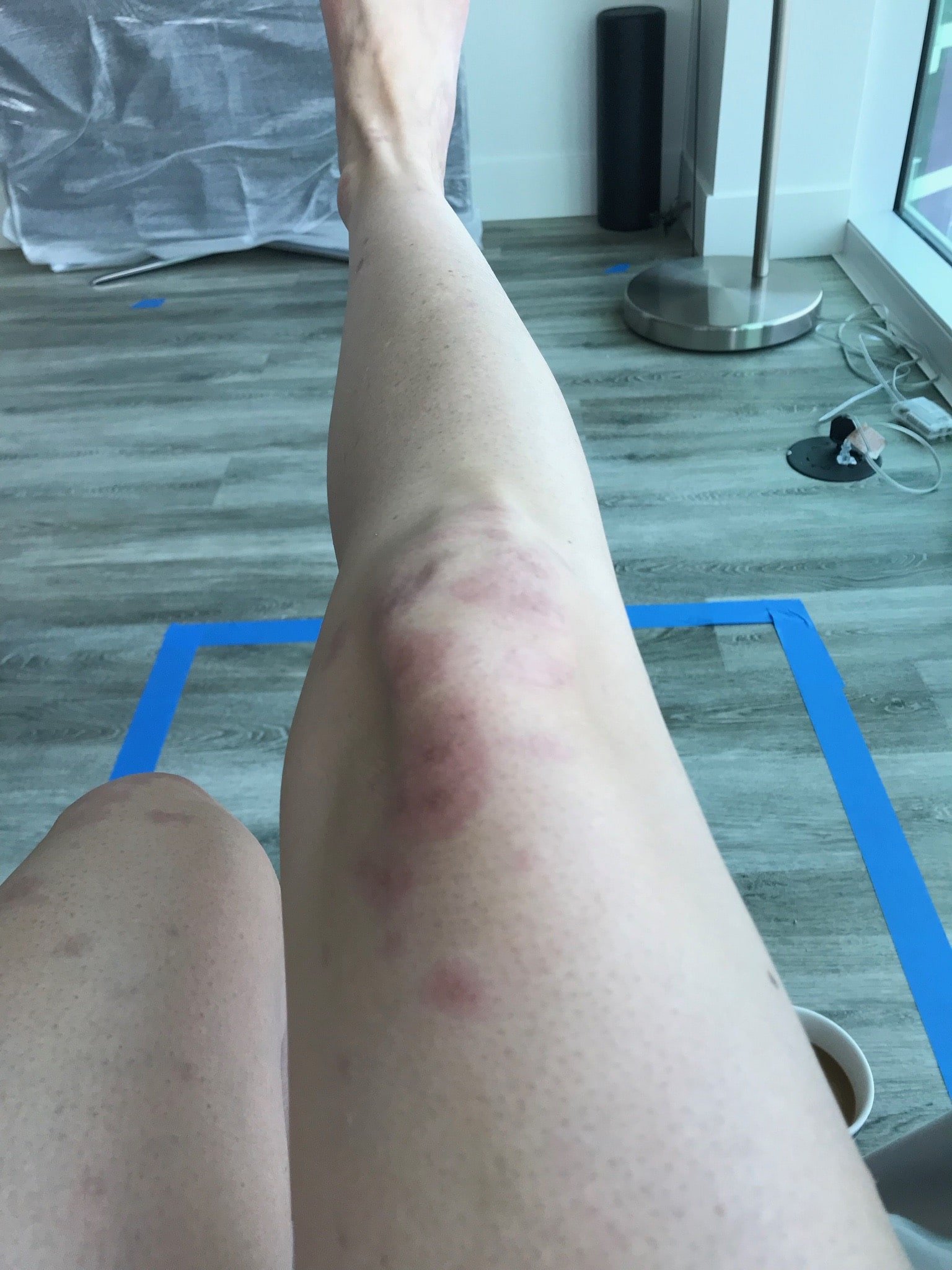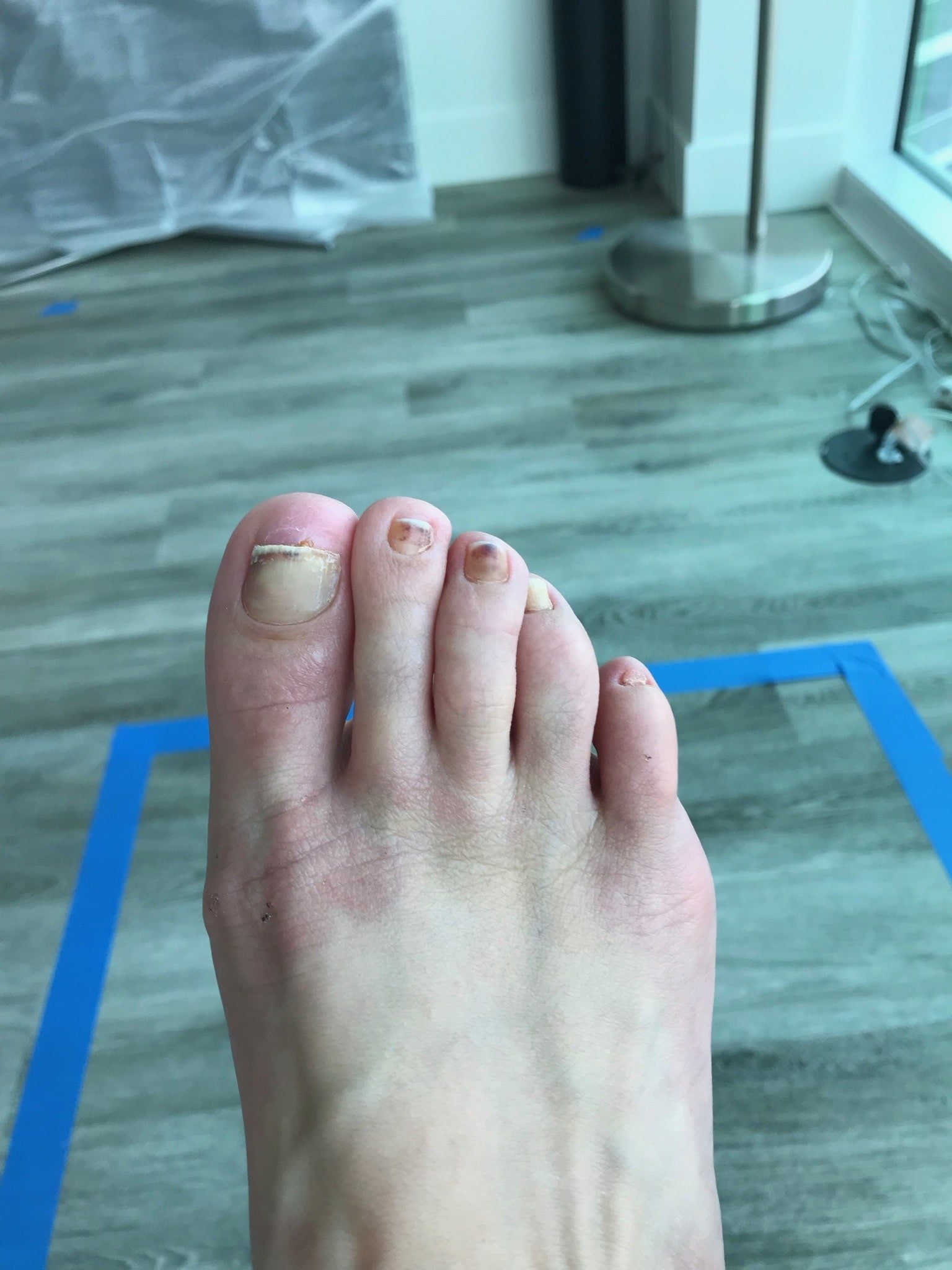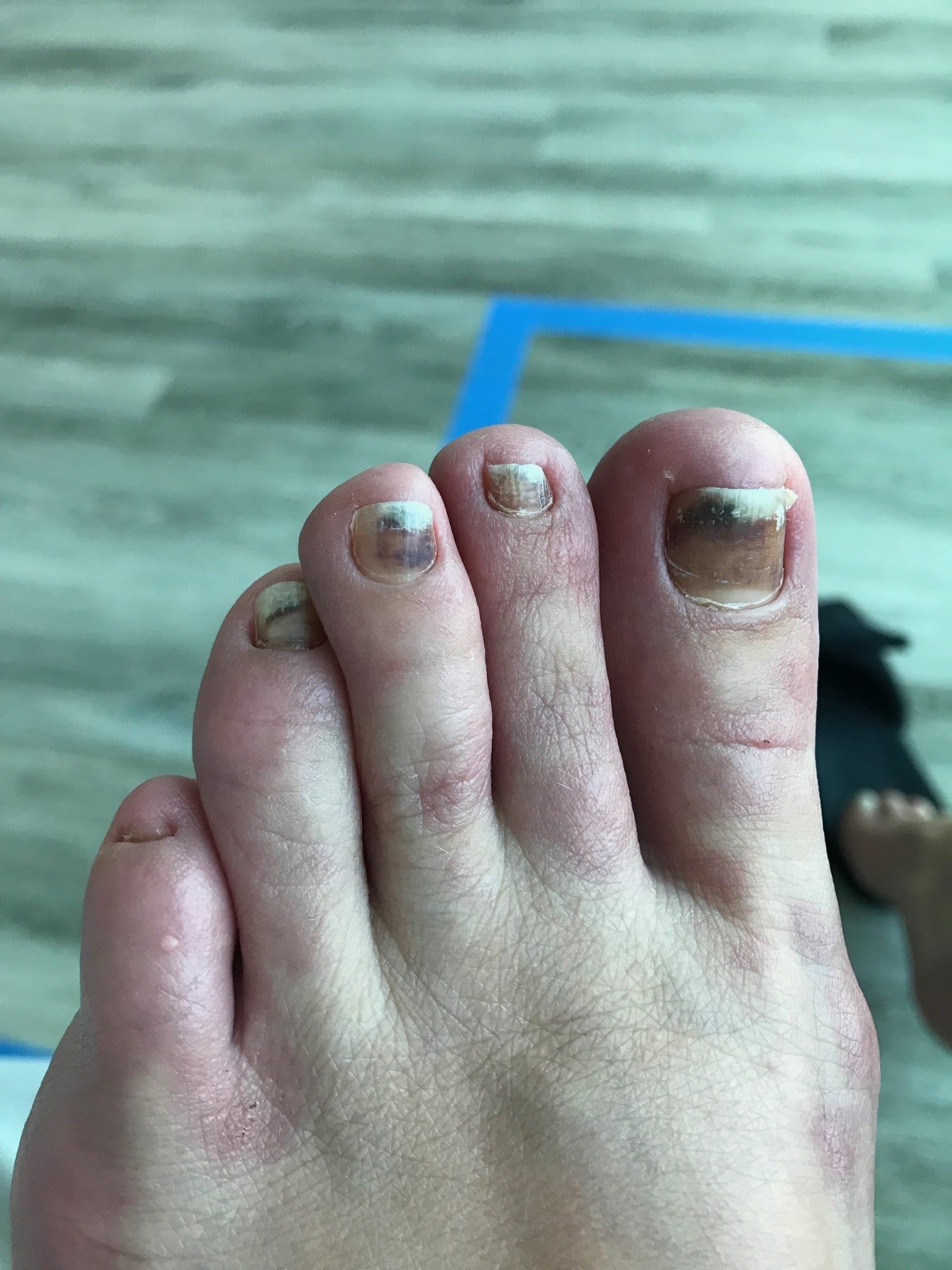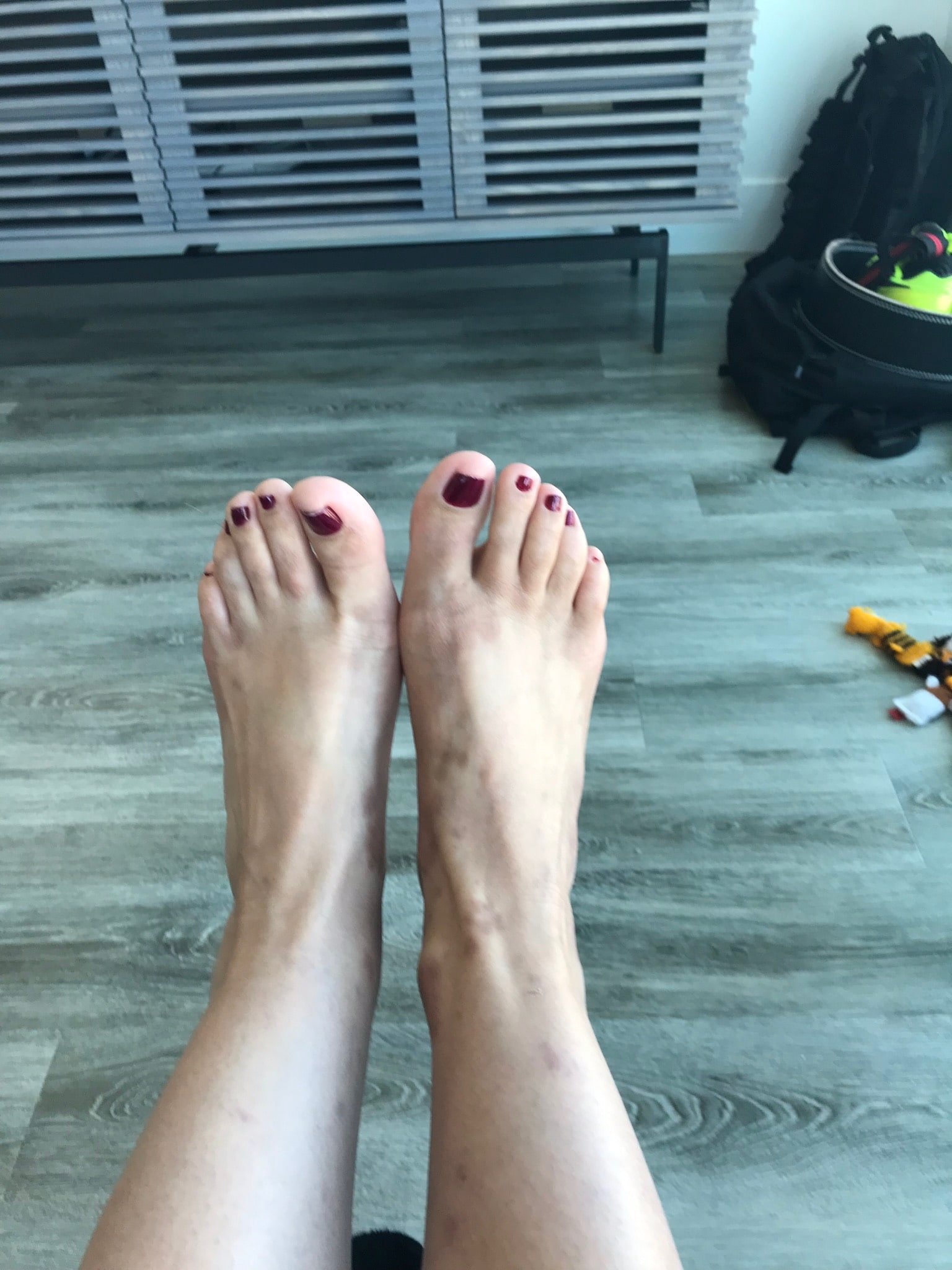Nicole’s Story Part I: If You’re Not Saying It, You’re Storing It
In June 2019, a stress-induced autoimmune response in Nicole Christie’s body led to her losing multiple layers of skin and all her toenails, yet gave her the gift of seeing how she needed to change how she showed up in the world—and for herself.
If gory medical photos are your jam, check them out below:
Show Notes:
Quote: “It’s not the 101st blow, but the 100 that came before it.”
Look at a stonecutter hammering away at his rock, perhaps a hundred times without as much as a crack showing in it. Yet at the hundred-and-first blow it will split in two, and I know it was not the last blow that did it, but all that had gone before. – Jacob Riis
The Cure for Chronic Pain with Nicole Sachs, LCSW
Background information on schema therapy
Background information on somatic therapy
-
[00:00:02] Welcome to Here For Me — a podcast about the power of choosing yourself. I'm Nicole Christie, and I'm honored to be here with you to share stories, lessons learned, and advice from leading experts that will help you show up for yourself with the love, honor, compassion, and encouragement you give to others. Because just as we say: ‘I'm here for you’ to show we care for someone, saying ‘I'm here for me’ to ourselves is the best form of self-care. We're talking today about boundaries. When we hear this term, it generally refers to where we draw a metaphorical line to protect ourselves and ensure our needs are met. But if you have people pleasing tendencies, as I do, boundaries sound great in theory, but are much more difficult to put into practice. For me, it literally took losing multiple layers of skin and all my toenails to realize how squishy my boundaries were, and how I'd been abandoning myself throughout my life. So let me take you back to that time when my body told me something was wrong with how I was showing up in the world. I've always been someone whose body is a beacon for what is going on in their life. Anxiety attacks, hives, hair loss, GI issues. I've struggled with a host of problems my entire life that mystified doctors for years and only resolved themselves when I addressed or eliminated sources of stress, toxic situations and so on.
[00:01:35] This particular situation happened in June of 2019. I was washing dishes and I felt a sharp pain in the palm of my hand. And I dropped the sponge and I saw three red spots on the palm of my hand and I thought that my sponge was infested with fleas and that something had bit me. I was like, okay, there's something in the sponge, threw it away, got a new sponge, kept washing dishes. Met a friend for dinner that evening and started to feel feverish over the course of dinner. 70 degrees in Seattle, we're sitting outside and I'm starting to have the chills. We finished dinner. I said, I have to go, like something is wrong. I'm not feeling well. I have the chills so bad. Got in the car and cranked the heat to 84 degrees in my car and was shivering the entire way home. I was extraordinarily stressed out. So to give some context about what was happening at that time, my husband and I had been in a long-distance marriage for seven and a half years. I was in Seattle, he was in Montreal. We were two weeks away from moving to San Diego to live together in a city, same city, for the first time. So that was happening. We're coordinating this giant international move. I was working an extremely stressful job in tech and I was taking a nine-month memoir writing class and I was in the final two weeks of that and my manuscript was due and I was about to do a graduation reading.
[00:02:58] So all of these things were happening at the same time. So I said to myself, I am probably extremely stressed out and I just need a good night's sleep. Go home, wash my face, brush my teeth and my gums, start bleeding while I'm flossing my teeth. Like, I don't know what is happening to me right now, but I really need to get a good night's sleep. So, I did. Got up in the morning and the spots were on my legs. Go to the dermatologist. He's like, I think you have some kind of virus or you had a virus and it's manifesting as this. Let me take a biopsy. I'll let you know. In the meantime, here's some hydrocortisone cream. Here's an antiviral drug. Take this and let me know how it goes. I'll let you know what I hear from this biopsy. Long story short, this got worse and worse and worse over the course of a week. I'm now eight days from moving to San Diego from Seattle. My husband is packing up his life in Montreal and I have been to the ER three times and told I have hand, foot and mouth disease and it will be self-limiting, it will get better, it will go away. But every day I'm getting worse and it looks like I have target lesions all over my arms, hands.
[00:04:07] Hands, foot and mouth are definitely the worst. Legs, feet. It's now so deep that it's eating into the connective tissue of my hands, so it's becoming difficult to feed my cat. Walking feels like I'm walking on glass and it's all on the inside of my mouth so I can no longer eat. I can no longer take the medication I was given. So my dad comes racing up from Oregon, where my parents live, because I'm bawling and saying, I, I don't know what to do anymore. I was also given a prescription for Vicodin and found out that I was allergic to Vicodin and my symptom was itching. And in the middle of the night, I clawed my lips off so that when I woke up, I had blood oozing out of my lips. So here I am, looking very glamorous. My dad shows up, horrified. He takes me to the ER for the third and final time. And the ER doctor says: we're admitting you. And we have a panel of four dermatologists getting on a conference call in an hour to sort out what is happening, because this is not a typical reaction. And it was hand, foot and mouth disease. And for some reason I had an autoimmune response and it was a condition called erythema multiforme. If anyone wants to look that up online, it basically looks like you have target lesions all over your body.
[00:05:24] I lost ten pounds not eating. Basically, I hadn't eaten for three or four days at that point. And they said, we're just waiting for a bed to open up so you can be hospitalized because we are trying to get you full of fluids and get you some nutrients. So I waited 8 hours. I was in a bed in the ER and finally they said, okay, a bed's opened up, we have to transport you to the other hospital and the other side of Seattle. And they admitted me to the hospital that night. And I'm alerting my husband, who is literally in the middle of moving from Montreal and saying, you have to come...like, now. And I said to them, how long am I going to be in the hospital? I have to move in eight days. And they were like probably a night or two. We just need to get you hydrated and get nutrients going and we need you to be able to take your meds by mouth. So I was actually there for a full week and I was released from the hospital the day before we had to move. So my husband had to pack all of my things, get me out of this apartment, just everything under duress, complete panic. Both of my parents are now there. Friends are coming and bringing me stuff at the hospital and telling me, ‘You know, you're on this like general floor.
[00:06:34] And there are really old people here who have had heart attacks and strokes, who have already gone home since the last time we visited you. And you're still here.’ At this point, I couldn't walk, so to get out of bed, I had to get a walker. It was extraordinarily painful because of how this was eating through the tissue. It would just feel like fire was coursing through my veins and getting out of bed and swinging my legs over the edge of the bed was like being electrocuted. And there was a whole process if I had to go to the bathroom of like deep breaths, my husband bringing me the walker, me going, okay, one, two, three, ughh. And like 12 steps to the bathroom, shaking the entire way. Every day at two or 3 a.m., I would feel like fire was just coursing through my veins and I would ring my call button for OxyContin. And about halfway through my stay, the night nurse that answered that call was fascinated by what was happening, could not stop studying me. ‘This is classic hand, foot and mouth disease. It looks like you have little rivers of blood running through your hands.’ And I said, ‘Please, just get me my fucking OxyContin. I'm in so much pain. Just please get me my drugs.’ And I had scratched my face in the middle of the night and opened one of the sores.
[00:07:51] And she's like, ‘Have you seen your face? Have you seen what you look like?’ This hospital in Seattle is in a neighborhood where there's a lot of drug issues and an unfortunate homeless problem. And she said to me, ‘You look like one of the heroin addicts on the street out in front of the hospital. You know, you can't leave here looking like that, right?’ And I just needed the drugs at that point. So I set that aside. 5 hours later, my husband would come in every morning and bring me Starbucks because the coffee in the hospital tasted like shit dishwater. And he came in with my coffee, and I was fortunate enough to be in a private room going through all of this. And he just brought the coffee in and he took one look at my face and I said, ‘Close the door, please.’ And I completely broke down sobbing. I said, ‘What if I never looked normal again?’ And that nurse was talked to. Unbeknownst to me, my husband went to the day nurse and said, ‘I understand my wife's in good spirits and she's being a very cooperative, patient. And maybe it seems like you can have a normal conversation with her, but she's devastated. She's terrified. And you need to tell people that they can't talk to their patients like that.’ At this point, also, the wounds were starting to open up and I kept saying to the nurses, ‘Can you send someone from wound care? Because I have like open sores on me.
[00:09:12] And every time I roll over at night when I'm sleeping, they're opening and oozing and it feels really unsanitary and I don't need to get a staph infection.’ What they had deduced at that point was that this was a stress-induced autoimmune response because I hadn't started any new medicines. I'd taken that Vicodin, but all of this had started at that point. There was no explanation for it medically why this had happened, other than the fact that I was under a ton of stress. So she just looked at me and she said, ‘Nicole, I don't know what it is you need. I don't know if you need to do yoga. I don't know if you need a new job or to meditate, but your body now knows that it can react to stress like this, and it will do it again if you don't change how you show up.’ And I was like, ‘Well, if it takes the wound care nurse who's bandaging you like a mummy for 45 minutes to wake you up and tell you you're not showing up for yourself in your life. I don't know what kind of wake up call I need.’
I was released from the hospital the day before we moved, and the doctors said to my husband...we had planned this whole romantic road trip.
[00:10:25] We had donated or sold almost everything we both owned and were planning to start over in San Diego together. But we did have this tiny U-Haul with like my personal belongings in it, and we were going to drive this U-Haul, which was a throwback to a story from our initial relationship when he moved from Seattle to Montreal and we did a cross-country trip and a U-Haul, and they said, your wife is not going in a U-Haul. She's not going in a dirty, moving truck with open sores. She will get a staph infection and die. So you're going on your own. And my parents were there in the hospital. You're taking her to your house and you're nursing her back to health, which ended up being two weeks before I was actually able to move. So my husband took our cat and the U-Haul and drove from Seattle to San Diego. At this point, the sores have healed enough that my hands looked like leather and they were like, you're going to lose all of that and you're probably going to lose your nails (because that's part of hand, foot and mouth disease). So I'm sitting in the back of my parent's car, peeling the skin of my hands off like a glove, and about a week later, my feet came off like a no show socks. And then all my toenails turned black.
[00:11:34] And over the course of about six months, they just popped off one by one. And then I slowly started walking again at my parents’ house. They were doing my laundry for me, wrapping my feet in garbage bags so that I could take a shower without slipping. I had to sit on a stool in the shower and I started to celebrate what I called small victories. So it's like, oh, I took like a full shower today. Not like a little spot bath. Ooh, I blow dried my hair for the first time. I put on some makeup, I put my contact lenses in. All of these things were like small victories. I walked to the bathroom without a walker. And finally at the end of June, so we're about a month in. I finally was well enough to travel. Everything had healed enough. I was still full of spots, so I didn't look normal. But everything had healed enough. And I could walk enough that I could put shoes on, I could put socks on. They'd been so swollen with all the extra layers of skin that I couldn't even get shoes on for a full month. And I booked my one-way ticket from Eugene, Oregon to San Diego, and that was the beginning of our life together. It was a complete and utter shit show from day one. So I landed on July 1st, my husband had a flight out the next day.
[00:12:43] He got me food that I could prepare very easily. I was totally alone in the apartment with our cat. He had been unpacking to the best of his ability, having started a new job shortly after he landed here. And everyone was saying to me, don't you dare do all your OCD stuff, all of your perfectionist stuff, and unpack all the boxes and clean and all the stuff that you want to do. And I was like, oh, fuck that. It does not matter that I literally had oozing feet and toenails that were popping off. I was like, I have these giant orthopedic slippers that are really comfortable and I'm going to unpack that fucking apartment. And also I woke up on the 4th of July, so I'd been in San Diego for three days to an earthquake, and we're living in a brand new building in downtown San Diego, and it's swaying back and forth. And I'm looking at the sky going, ‘You're fucking shitting me right now. This is absolutely not going to happen.’ Okay, that was fine. No damage. Continue to unpack, continue to make my microwave meals. I actually found the strength to go and get a haircut and start feeling like a normal person again, even though I was spotty and I just looked awful in Southern California, so image conscious and I was like, I don't actually care. And then July 5th, I was unpacking a closet at 8 p.m..
[00:13:57] There was I think it was like a 7.2 earthquake and all of the doors in the apartment started moving, and the cat’s ears were like close together on the top of his head. And he's just looking at me and I was like, ‘Just bring it at this point, like, really? Really? Okay. I'm glad that I landed in San Diego and the earth literally fucking moved.’ And I just stood there and I was like, ‘Are you done? Because I need to finish unpacking this closet because I am moving on from this bullshit.’
So that was the beginning of our life together and also the beginning of probably the greatest wake up call of my life.
So you might be asking what I was feeling as this was happening. I never thought that I was going to die. I never felt that I deserved it. Although a lot of people said to me, you know, you don't deserve this, right? And I thought, who deserves this? I mean, this is not a fair world. Shit happens. Bad things happen to good people. Good things happen to bad people. I have no idea why this is happening. It's just something that I have to endure. So I never felt that I deserved it. I worried that I wouldn't look normal. I didn't know how in the hell this was going to heal. And then this healing went on for probably 6 to 9 months.
[00:15:16] I worried that I wouldn't walk again. That was actually the scariest thing, and I didn't know what the impact of that would be on my life. Throughout all of this, the thing that I was most pissed off about was that this was happening now, not that it was happening. I was like, but this could happen to anybody. Why not me? I'm not asking, why me? Why not me? Why not anybody? But why is this happening now?
I'm not necessarily someone who believes things happen for a reason. I think there is a lot of senseless bullshit in the world. But I do believe that we can and should reflect on everything that happens to us and extract the lesson. That's what we're doing on this podcast. It's why I'm starting with this story. I feel like we live in a world that moves too fast and we're not reflecting on what's happening, what we can learn, and how we need to show up differently (primarily for ourselves), which ultimately has a broader impact on the entire world. With respect to this particular experience, I really did sit and think: What can I take away from this? What can I learn? It's not why. It's not why me? It's what can I learn from this? How do I need to show up differently? Because I've been told that I have a stress-induced autoimmune response.
[00:16:34] And we can't always control the stress around us, but we can control how we react to it. And I'm clearly not doing a good job. And I had two friends. One is an acupuncturist, and one is a mindfulness teacher and a meditation teacher. And both of them asked me in the immediate weeks after this experience, what do you need? And in that moment, I realized I can't even answer that question. I don't actually know what my needs are. I think that maybe I don't have any, that I can meet them all myself. I don't know how to articulate them. And I actually don't even think that I deserve to have needs. So there was a lot of subjugation of my own needs happening and also just low self-worth, honestly, and believing that I was essentially here to serve others. That if somebody asked for something, I had to do it. I had no choice. I was here to serve my husband and what he wanted, my colleagues and what they asked for, my parents and what they needed, my clients and whatever they said. It was like: I am grateful to be loved, grateful to have work. That was not obviously anything that I articulated or said out loud, but that was the subtext of everything. Every way that I'd been showing up for myself was like, I don't deserve it. I never reflected on whether something aligned with my values or even made sense for me to do.
[00:17:56] I just thought I was ‘helping’ all the time. And unfortunately, we live in a society where women in particular believe that self-sacrifice is being good, that we don't have the right to have needs. But it's kind of that whole thing about putting your own oxygen mask on first, filling your own cup. We can't be anything to anyone if we're not putting ourselves first. And my friend, who is the meditation teacher and mindfulness teacher is the one that made the connection for me. And she said, ‘You know what's interesting, Nicole, is our skin and our nails is our body’s first line of defense. It's the ultimate boundary. And yours just sent you a really big message. You had a literal fire alarm in your body. It felt like fire was coursing through your tissues. Your body burst out into red lesions. What do you think that's telling you?’
I was stressed beyond belief. In fact, when I tell the story, I often tell people I felt like I'd been moving through peanut butter for months. So there was a sensation in my body of tension and not being able to move forward with the velocity that I'm used to in life on a regular basis. I'm a pretty high energy person and I was also over functioning at a toxic level. I had to make a different choice. I had to live differently.
[00:19:24] Interestingly, when I was released from the hospital, they told my husband and me that there was a 15% chance of death from this. Because had I not gotten the appropriate treatment, sepsis would have been the next phase. So being very fortunate to be a privileged person in this country who has access to excellent health care was paramount in literally saving my life. That's what stress can do to you.
So in the time that I had to reflect on what had happened and what I had learned, you know, I had this nurse that said to me, ‘You have to show up differently in the world. Your body knows how to do this. It will do it again.’ I had the friend who said ‘Your skin and toenails literally disintegrated. Maybe that's a metaphor for the fact that you're not setting strong boundaries.’ I had to think about how I could choose myself; not only recognize that I had needs, but be able to articulate them, and believe that I was worthy of having those needs met. I had to work on my sense of self-worth, and this is really where I came to believe in the power of choosing yourself and what happens when you don't. What happens when you prioritize everyone else's needs around you. I think when I felt like I was helping other people, I felt like I was always taking the high road.
[00:20:57] And sometimes the high road looks good on paper, but it's actually abandoning yourself. There's a great quote, and I'm not going to attribute it appropriately, but it's essentially it's not the 101st blow, but the hundred that went before it. That was certainly what was happening here. It wasn't this one isolated incident. It was a lifetime of having GI issues, migraines, rashes. You're not listening to your body sending up red flags over and over, now it's literally going to send up red flags to get you to listen.
So in recognizing that I was abandoning myself, was not able to set boundaries, didn't believe that I had any needs at all, much less could articulate them or believe they had any right to be met. I started working with a therapist to address trauma, which all of us have, and trauma is kind of a hot topic right now. There are a number of experts that talk about ‘little t trauma’ and ‘capital T trauma.’ Nicole Sachs is a great person to talk about this. She has a really wonderful podcast called Cure for Chronic Pain. So Capital T Trauma: loss of a parent when you’re young, sexual assault, big stuff that you know people deal with. Little t trauma: things like your emotional needs not being met. So I started working with a therapist to address complex PTSD. And one of the things that she modality that she uses is called schema therapy.
[00:22:26] Schema identifies the ways that you show up in the world as a result of how you were raised. And there are 18 different schemas. One of mine was literally called subjugating needs and that that was how I had learned to show up in my family of origin and then perpetuated that in every relationship. Friendships, work relationships, romantic relationships. Let me suppress me to meet your needs. I don't matter. I can take care of myself. I also started working with her in somatic experiencing understanding how trauma manifests in your body. And there's a great phrase and I'm not going to attribute it to the right person, but it's if you're not saying it, you're storing it. So if you're not setting boundaries, if you're not advocating for yourself, if you're not pushing back to take care of yourself in the ways that you need to, you will store it somewhere. It will find its way out of your body. And this was such a giant fire alarm, it was like, okay, clearly I've stored trauma. I've stored all of these issues that I've had throughout my life and I'm not dealing with it well. So my body is telling me, hello, I'm going to send you some red flags. But one of the things I started doing in therapy was accessing old memories from my childhood and other relationships in my life, not just family of origin, and finding out how they were stored in my mind and then how my body was feeling those as I would remember them.
[00:23:55] And it's really fucking intense work and it's really painful. And I have a sound booth at home. This is a recording studio that my husband uses. I also record in there for podcast and other things, and that's where I would do my therapy during the pandemic and my therapist would say, ‘Nobody can hear you in your sound booth. I want you to hit the walls and scream and tell me what you're feeling as you do that.’ And I would feel my lips going numb. I would feel buzzing in my arms in hands. I would feel tension in my neck and shoulders. And all of these things were ways that she would say, ‘This is how you are going to identify when a need is not being met. Your body is going to send you these signals. You have learned to ignore those signals you haven't even recognized until I basically almost hypnotized you that these are things are happening.’ So we've kind of gone back and figured out what are some of the original experiences. Not all of them, but how have these things been manifesting in your body throughout your life and then what's happening in your current life that is triggering them and then causing these serious health conditions.
So what does that mean for how I show up differently now? Like everyone, I'm a work in progress.
[00:25:15] I show up differently sometimes, but not all the time. Anyone who tells you that a thing happened to them, they processed it, learned the lesson, and is now different as full of shit. Everything is a pendulum. So as you heal from anything that doesn't serve you, you will likely swing from one extreme to the other. But this is part of the process. And having compassion for yourself is key because you're learning to show up in new ways and in ways that feel uncomfortable for you. For me, I have slowed down a lot and I really try to pay attention to: ooh, I have pain in my body. My therapist used to tell me that when I was in session she could see me clenching on the right side when I talked about certain things. Sometimes my gums tell me that because they're raw, so it's like, oh, now I'm clenching. What's going on in life? Your emotions are a cue to where your needs aren't being met. We live in a society that prioritizes the cerebral over the emotional. So, we tend to ignore that our emotions are messages. So I try to tune in and go, I feel pissed off, I feel disrespected, I feel abandoned. What's going on? What is that a cue to? What is my body telling me? When I'm not speaking up, I get tension in my jaw and my neck and then what is the need that's not being met and how do I articulate it? For me, that's always the hardest part.
[00:26:32] It's easier for me in writing. I am a writer by trade, at heart. My entire life, that's and my career, that's what I've done. So it's always easier in writing. I have the time to formulate a response. It is much harder for me when I'm face to face with someone and I need to set a boundary or speak up for myself. And I have a tendency to either stammer or lose my shit. It's like, oh, I'm trying to speak up for myself. I'm struggling because on some level I don't feel that I'm worthy of this. The pendulum is it comes out sometimes in a really unprofessional and emotional and hotheaded way, but it comes out. So I'm trying to give myself the self-compassion I'm having is you said something. You know, three, four or five years ago, you would have said nothing. You would have stuffed it, right. If you didn't say it, you were storing it. You would have stored it somewhere in your cells. It would have come out in some other physical symptom. So at least I'm saying something we can work on the why don't you say this in a little bit nicer way, a little bit more kindly. This is where self-compassion comes in.
[00:27:31] And Kristin Neff is renowned for her work on self-compassion. And she teaches us that we have to be gentle with ourselves. It's actually what allows you to be resilient. I think there is a common belief that self-compassion is giving yourself a pass.
Catherine Andrews, she's a great life coach, shared an example in one of her newsletters called The Sunday Soother, where she said, It's like if you're walking a tightrope and I'm paraphrasing here a little bit, but you're walking a tightrope over a ravine and self-compassion is the ravine is filled with pillows and a down comforter and a soft fuzzy blanket and stuffed animals or you're walking over a ravine is filled with fire and daggers. If you fall and you fall into the pillows, you can bounce back intact. If you fall onto the daggers, it's really hard to bounce back and have any resilience to keep going towards whatever it is that you're trying to achieve, which is probably one of the best metaphors for self-compassion that I have ever heard. So you have to forgive yourself for not being great at this. You're not going to be great at setting a boundary right away. It's really not any different than learning any other skill you are learning. It's beginner's mind. It's a growth mindset. You might have to backtrack, apologize, you might have to lose your shit and work through it yourself later. You might have to go back to that person and say, I'm sorry.
[00:28:50] And you know what? Sometimes it's really good to be candid and be like, ‘I'm working on setting better boundaries. I'm working on taking better care of myself. That's not your responsibility. I just wanted you to know where I'm coming from and apologize and I'll show up differently another time.’ You may piss people off, you might lose friends and more, but you have to be okay with it. In fact, practicing this with people who have crossed your boundaries for years and should probably not be in your life anymore, might be the best audience for it. If they get mad and they go away, then mission accomplished. I've certainly had people in my life throughout my entire life, we all have, and still have people in my life who cross boundaries, who push buttons, and I would say who take advantage of me because they know that I have the tendency to subjugate my needs and do whatever it is that they would like me to do. And they're the people who get the most mad when I push back and they're the ones who are the most resistant. So then you have to ask yourself, is this worth it? The people who really love and support you will get it. They will support you on this journey. They want you to be your best self and they will forgive you when you don't show up as your best self as you're learning to because it's a process. You actually win either way when you show up for yourself, when you are here for you. Whereas before, everyone else won. And you lost all the time.
[00:30:10] My ultimate boundary, my skin, my nails sent me a very loud, clear, red blistered, angry warning. I'm still learning, but I heard the alarm. I tell you this story so you don't have to lose your skin and toenails to install your own internal alarm, your own filter for bullshit boundary violations.
What is your body telling you? What internal alarms might be going off that you haven't listened to? And if you have the stomach, check out the photos of what I now call my skin peeling crisis at hereformepodcast.com.
As for me, apparently I needed a second alarm from the universe to get me to be here for me because it happened again the following year in an entirely different way. Tune in for that story and the lesson in episode two.
Here For Me is produced by Lens Group Media in association with Tulla Productions. My deepest gratitude goes out to the people I am blessed to work with in bringing this show to life: Dave Nelson, Stacy Harris, Amy Kugler, and Amy Senftleben.
If you like what you hear, please follow Here For Me, and leave us a review. Until next time. I'm Nicole Christie. Thank you so much for listening. Here's to you being here for you and to the power of choosing yourself.
